#narrative of choice and control in a world that’s seemingly scripted
Explore tagged Tumblr posts
Text
I remember people kind of. Complaining. About Melia’s position in Rejuvenation’s plot of how she’s more of the MC than Protag and how everything seems to curate to her. And. Well.
It does do that. But not in the fashion of raising her up. She’s basically the Narrative’s Victim. She kind of gets ripped out of her seemingly normal life and gets isolated from anyone familiar to her for 3 years. Proceeds to reunite with her newfound strength back to the original timeline. And then immediately faces the burden of fulfilling Nancy’s request. Terajuma happens, Team Xen, her Dad Dies. Doomed Timeline. The truth about her family. Genesis Syndrome (I forgot the Name). and then Zeight happens and at that point she’s been brought up only to be beaten down by the events again and again that her optimism and whimsy at the beginning was a Huge echo of the present. If you go through Renegade, you find that the betrayal absolutely shatters her tether onto the story, and her efforts of rising up to the challenge with hope have been completely disregarded. Like they didn’t really matter, because she wasn’t the one with the power to make it matter. M2 is a desperate sort of attempt to achieve something out of the experience, although its persecution rather than resilience. An attempt at justice.
I do think the protag stands as the Protagonist of the narrative, but as it’s Witness, jury to Judge sort of deal. Regardless of what path you decide to take, some events are rather concrete and Don’t change. There are things you can only observe and not Interfere with. As the interceptor, they don’t have quite all the pieces to completely change events, whether intentional or not. But they have the critical pieces. They simple have interferences in moments that seemingly Matter to the narrative. And really, any sort of control of the narrative is what gives them Power. Especially in a world that’s seemingly Programmed from inside out. They listen to the world, and react to it, judge it, and sentence it. There’s always going to be opposing forces no matter the path they choose, but their position is what puts them above the rest.
#pokemon rejuvenation#talk#I hope this makes sense this is just a rambled structure#I hope this also explains why I’m so insane about the protag Melia dynamic. it’s fascinating.#this may also be Completely Wrong I’m reciting this from my memory of their dynamic. So. do throw hammers if needed.#ok Thank You I will always like these two very much and throw them at a wall#this too can be or-(gnome runs by) hey what the hell#my ooc brain may have kicked in here as well so. forgive me if so.#but I do stand firm in the idea that Melia is someone that Does become Jaded. she’s resilient and installs hope when possible and it’s not#like she’s consistently pessimistic and looking down on her situation.#it’s just. so many things seem to be Specific to beating her up about it whenever she gets a stable foot#? girl where’s your photography hobby.#what do u think a protagonist does. win everything? it’s a rather presumptive perspective#rejuvtag is living their best or worst life ever meant to Look and Listen and React !#they make the decisions that Matter they are subconsciously changing the track of the train#it’s still going to run but they can take a left turn than a right CMONNN#narrative of choice and control in a world that’s seemingly scripted#disclaimer: this is a JJ personal take of what I consider the game’s narrative if I’m wrong u may throw tomatoes
19 notes
·
View notes
Text
My Adventures with Lois-Chan season 2 (I see what they're trying to do with Kara Snore-El, the question is how far are they going to take it? And will they commit or just play it safe despite how serious the topic is?)
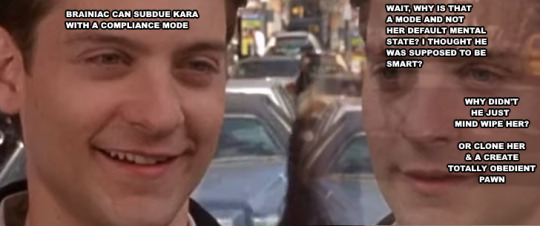
They're trying to pull a X-23/Cassie Cain/Iron-Giant/ Son of Darkseid with this one.
First glance it looks like promise, but what's going to make or break this decision is what they do after the fact.
Keywords: "-AFTER the fact"
What exactly are you going to do with the fact that she's committed genocide?
And it's very unlikely Brainiac wouldn't just mindwipe her entirely, so that obedience mode she enters isn't a mode, it's her default state.
Why would he even allow her to keep anything close to a personality, that already doesn't make any sense as it didn't make sense when Supes got brainwashed in Legacy arc in TAS.
But this is Brainiac we're talking about, if anyone has a method to wipe a persons mind clean it's him.
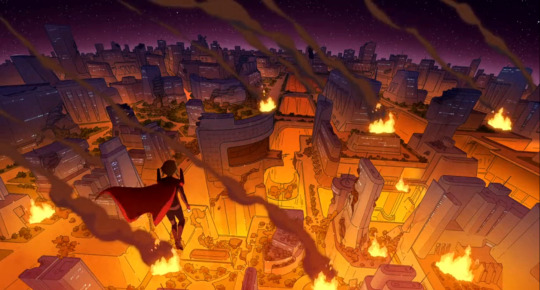
See if they just have her become the usual stock Supertoken/supergirl, cape & all and just go about the script per canon usual then the backstory setup was a total waste and only served to just be edge bait, jangling keys and nothing more. Another waste of potential for this sinkhole of a character.
Now her wanting to be a hero would be a semi-sensible way for her to attempt to "do good" to make up for the wrongs buuuuut this is genocide, saving a cat out of a tree or putting away the same 3 villains isn't going to even begin to make up for that shit.
So I sincerely doubt whatever they do after this is going to be anything close to an appropriate direction for what she did.
See with that said- there's already brewing problems with this. And when I first saw it, I thought "Hm, okay, there's potential here."
Mainly because of how she reacted to the truth, which is the point of her emoting, to make you sympathize.
Sidenote: I can't stand Kara as a concept, I make ZERO attempts to hide that, and yes they did the bullshit cousin thing which annoys the shit out of me but they can still do something halfway decent here even if it's mid per the show's usual standard of writing.
Furthermore, even if the execution is shit, i'll give the writers some credit here for introducing her with an (albeit lazy) attempt to make her somewhat interesting though (basically Young Justice S4 all over again), the best way they can give her intrigue is make her "evil" seemingly (always some mind control or conditioning, she's never bad by choice, which defeats the possibility of her being interesting or engaging) and then turn her into an accessory after she is eventually/inevitably turned to the good side.
I don't see why DC is so afraid of making Kara a legit Superman villain or taking risks with this character who desperately needs an overhaul.
Top 5 baddies, calculating, in charge, with a purpose. There's nothing wrong with that, why the fuck does she always have to be a good guy, when the world already has a SUPERMAN? That question never gets brought up more.
When all that happens when she's good is she gets shrouded in the shadow of Superman anyway because despite the attempts of so many writers, she does not possess the impact, themes or narrative/symbolic legitimacy, she literally just exists.
And unlike Batman who can have many protege, Superman's hook initially was being the last Krytonian. So not only does her existence null the impact of Kal's survival in the first place but the world doesn't need two Super-people, it's just redundant.
The only reason why Conner gets a pass is he's the clone gene-baby of Lex and Supes, thus nowhere near as powerful. And the fact that he's not native to Krypton doesn't in any way negate the impact of Kal's survival narrative.
And the storytelling potential of being both Lex and Superman is a goldmine.
From SB-Prime to Conner, they keep giving the better origins and stories to the male Kryptonians, and DC refuses to shake the formula.
Make that shit make sense to me.
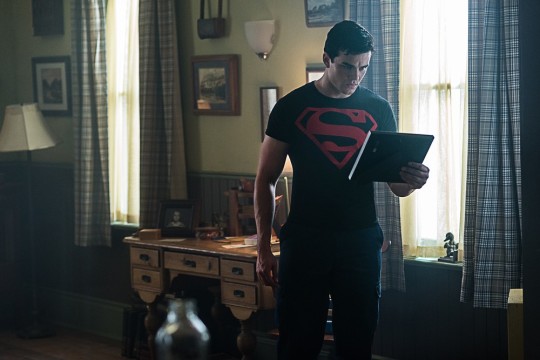
Back on the show, they really shouldn't have made her his cousin, again.
That takes so much agency from her when her stake in the story is being Superman's cousin like the canon, and not just a Kryptonian with her own stake that somehow survived or say she was off on an independent scouting mission as a researcher boom, Argo gone.
And she has her own name. Still a knockoff, still trivializes the original point of Kal's survival but that's an improvement.
It's why Kara In-Ze is a slight improvement that people don't appreciate enough. Though there wasn't enough done with her too.
(Yes, I'm complaining there wasn't enough Supergirl in the DCAU, and I'm the guy that hates Supertoken. BUT to be fair, her lore in the DCAU Timm-verse comics more than makes up for it, so it balances out but her NOT being in JL vs Fatal Five? Unforgiveable)
Overall, the miraculous surviving cousin trope is bad fanfic and again it trivializes Clark surviving at all, hence why I hate Kara's existence. But PLEASE stop using the cousin schtick, allow Kara to stand on her own two goddamn feet for once.
yet again my gripe specific to this show is I don’t think these writers are thinking this through. The one time they take advantage of the “Adult” in the Adult Swim and they overshot their shot with genocide.
I thought: "Oh? This might have potential for this version of the character."
But then I thought, "Wait minute, they're not going to revert her to a normal status quo & put her little ass in a cape and hero suit after showing her doing that shit are they? (though tbh they didn't show her do anything, it's adult swim and they pussied out of showing her actually doing the deed)

-How the fuck is she going to integrate, when she's technically an intergalactic war criminal?"

Now if you gave her legal immunity or some kind of galactic supervision fine, but one of the only legitimate ways to set that up is if Superman asked John or Hal to put in a word or pull strings with the Guardians but a seasoned Justice League (where that possibility would make sense) doesn't even exist- so that prospect is completely null.
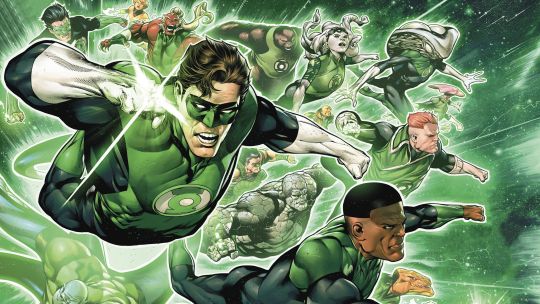
See this is what happens when you don't think this shit through, and unfortunately this doesn't get the excuse of being a "kids" show, and it really should be because it's written like one, just not as good as better kids shows.
Because despite My Adventures clearly being written for 13 year old girls/Shoujo fans going through their shipper phase, this tripe is actually on adult swim- for some reason.
(ATLA is also leagues more mature in writing)
Point being: Just edgy backstory is setup, set up can create intrigue but what makes one interesting is what exactly do you do with it, where you take that is what makes a character, that's the ONLY reason why Zuko works as a character, it's the ONLY reason why MCU Tony Stark isn't the worst character in the MCU, somehow.
She better have some serious issues from this beyond just curling up in space with the pouty sad anime girl face, mid.
Don't want her to look too ugly with her bawling her eyes out, snot & shit, because you know-
it's only GENOCIDE, right?
Really that broken up about it huh Kara?
See this is why I cannot stand this show. It's so half assed. And the fact that S2 was lit before Episode 3 of Season 1 dropped is a disgrace before the show could earn the right to continue someone had the connection to get their brain baby 2 seasons before it could prove that it deserved to even finish season 1.
And then by sheer fucking luck Lois-Chan and James just HAPPENED to TP in front of her, are you fucking serious? LMFAO, that's amateur webcomic levels of convenient and that's coming from me.
So not only can't we nor the girl meditate on the previous revelation for a goddamn second and see her deal with it for two minutes alone, and let the mood settle.
Not only is that cut short but they just happened to show up in her lap pretty much.
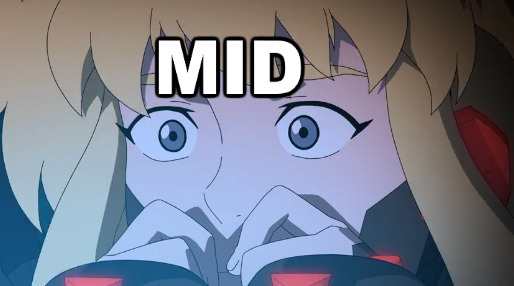
This title apparently has not changed since I last dropped it like a bad habit. Holy shit.
To wrap this turd sandwich up,
Drug problem, feverish nightmares, violent hallucinations, some kind of serious brutal trauma. Because HELLO? ADULT SWIM, maybe use that to your advantage writers? Use it to your benefit with some serious storytelling, HELLO? Goofballs.
You wanted Kara here, just like I predicted since Season 1 Episode fucking 2 (Because DC/WB can't get over their Kara boner and neglect to give other better lady characters in DC time to breathe *cough cough, where's Starfire's Show? Headass!??!)
Well now she's here, now do something with her or keep doing what you've been doing and just set her up...aaand then she crashes and burns into obscurity. Like she's been doing for the a past 30+ years.
I'd settle for her not becoming a "Superhero" and living her own life figuring how to cope with what she did, saving people on the side.
Or? For a better take if we skip tween shit and just debut her as a grownass woman like Smallville did to an extent.
Be like Victoria or Valora-El and have her be a Supe in a position of infrastructural status where she can make another brand of difference that isn't just sloppy seconds of what Superman is already doing. ie. Being a redundant character in deed and name.
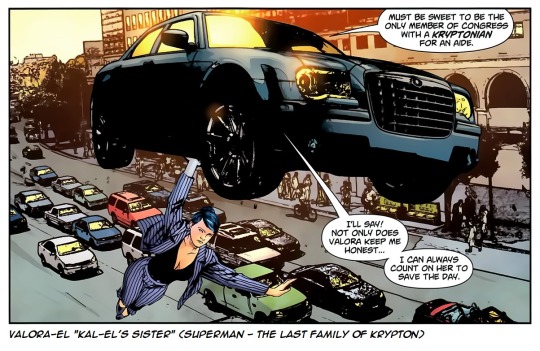

Anything less or to the contrary is cop-out, and yet another example waste of potential, which is a classic fate for Supergirl.
If she killed a few people, okay still bad, but it's doable, but multiple GENOCIDE?
I repeat: MULTIPLE GENOCIDE?!
Ohhhh buddy. These writers better hope they know what they're doing pal. Not me hoping they know what they're doing-
No THEY better hope THEY (guys/& gals/writers) know what they're doing.
Cause this can easily go messy mode if they don't treat this with the appropriate care. Jfc.
And yes, I have pitched many times to make her dark, but that was the make her Superman villain permanently, clearly that isn't their agenda here.
The difference is, I would've had her be a recurring Top 5 Superman foe. Not some superpowered "uwu kawaii" girl next door gimmick who's stake in the fandom is exactly that or being a female superman DLC vs her actually being taken seriously for once in her history.
See she has stans, she has fans, she has cool moments (MOMENTS, keyword) but does anyone truly take her seriously? But she gets all this goddamn push.
One can try to argue that her having memories of Krypton makes her pain & anger stemming from that sort of interesting, not really-
her concept is the same as Superboy-Prime's origin but for her: without everything that made him iconic- his mental issues, his very real, very realistic ramification of a teenager losing too much, too soon all at once. Intrigue, something was actually done with the fact that he was traumatized, and it wasn't backtracked, it was expanded upon for better and worse.
And in the end, bro saved everyone, and I mean EVERYONE. And nobody will EVER know it was him- why? Because he doesn't deserve the glory, but he was owed a chance to live the life he had before it was snatched from him.
He didn't deserve happiness after what he did, but he finally did right and was rewarded happiness.
That's the kind of shit that deserves to be in a show.
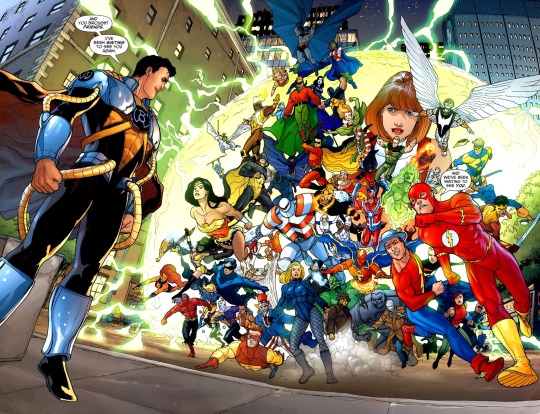
And he was manipulated on top of that, sort of like Kara is manipulated by Brainy here.
But it's likely not going to lead anywhere beyond her siding with Clark-Kun and beating Brainiac, saturday morning kidz cartoon shit.
Point being: People like her profile because she looks appealing, a concept of a female superman, female Kryptonian is a nice thought. Female, that's the gimmick.
She's always had potential, but it's always played safe or backtracked. Now we have her being a genocide puppet, which is a nice set up but the likely outcome is they'll sweep it or go the usual Sueprgirl route despite what she did.
I sincerely hope they do NOT do that, that is the wrong move.
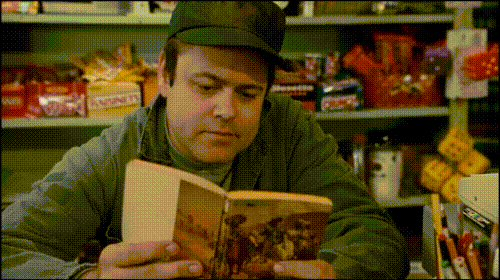
A lot of people (including me sometimes) don't truly understand the gravity of genocide when they want to use it for a character's narrative, it makes for a good hook I get it-especially when the character regrets it or is a villain like Omni-Man.
Or as a premise.
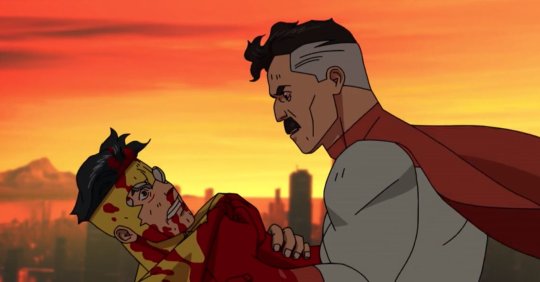
But a lot of writers don't want to commit to how big a deal that shit is in ramifications but want to flaunt it just for the sake of tugging heart strings when the character gets in their feels over it.
My charge is specifically: What are the ramifications for the character's humanity, their mental state, them as a person, how they view themselves, will she want to end her own life over this?
That's the kind of shit i'm talking that would make her leagues beyond in depth over the majority of her other variants (including her canon) in terms of depth, beyond the female superman gimmick, beyond the nepotism factor that Kara owes her entire career to.
But again I doubt they have the balls to go that far, even though that's exactly what they NEED to do given this is a situation involving a one-woman genocide.
That's why Invincible Season 1 Episode 8 is so good, EP3 was more of a spectacle we didn't think too much of Nolan wiping out that planet but when it happened to Earth, seeing that mother & daughter die, you feel that shit. It makes you feel how serious that shit is. When you watch reactions to the episode, people physically cringe are distraught by it. GOOD, that's the right way to present it, because it's not a joke.
My Adventures with Kara-Chan Reads like a "look, aren't they so tortured? Are you sympathizing with the cute girl yet?", nah man. You need to do a lot more than just show her cringing with "shocked anime girl" face:

(That's what she looked like, like she sent her term paper to the wrong email address "Nooooo, i couldn't, i don't remember", Wow i'm really choked up about this along with you sister. Such a stale performance, Iron Giant showed more emotion when he thought Hogarth died.)
How the fuck you get out acted/Emotioned by a goddamn Robot who managed to cry without shedding a tear.
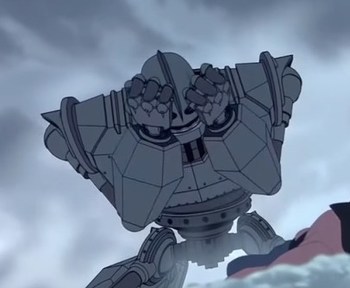
Again, WB feels the absolute need to push this underwhelming nothing character over and over again just for her to meet the same brick wall because the general demo? Contrary to popular belief, doesn't give a shit about Supertoken.
She works in concept, but she has zero staying power.
Most people like her because she's an aesthetic, a gimmick, a checked box, like Mid-Morales. They look nice on paper, they're a nice thought, they look great on design sheets. What they represent vs not what they are. Most People like what they are, than who they are. Not all, most.
But this attempt at Kara? Depending on what they do as of post Season 2 EP6, even if the aftermath is mid (and it likely will be mid) at least do something dynamic or risky with that set up, just tragic backstory isn't enough.
Fact is, to wipe out that many people?
Writers better deliver on that shit & make her 2% the interesting/ complex character Azula was in terms of issues, or Guts.
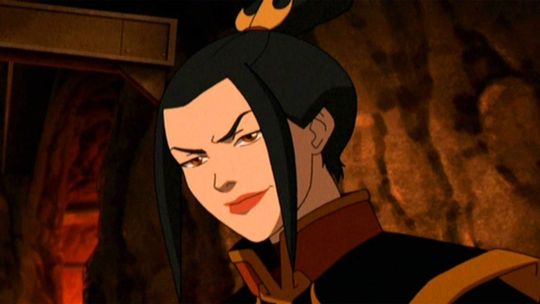
Because they're doing this cutesy anime shit, the same shit they've done with Lois but with Kara it's the strict tsundere who's not privy to norms schtick.
So basically Starfire just more "hmph" frowny faces, it's so goddamn annoying how hard they're trying with this anime aesthetic bullshit but not trying hard enough with literally everywhere else that matters.
It's amazing that that's the main thing that's consistent since Season 1 lmfao.
Not holding my breath, but we'll see where they go with this latest attempt with Kara Bore-El.

Sidenote: Reiner wasn't handled the best overall but him developing lite Schizophrenic symptoms out of guilt due to the many friends he betrayed to accomplish his mission was actually a sound decision, one of best in the story because that's actually doing something with the guilt, now did Isayama commit to taking it to a fine conclusion, ofc not, but that was a good direction to go in that wasn't expected. I'll praise that much.
That wouldn’t be a bad direction for this version of Kara Bore-El, a believable ramification.
They should’ve made her into a villain instead
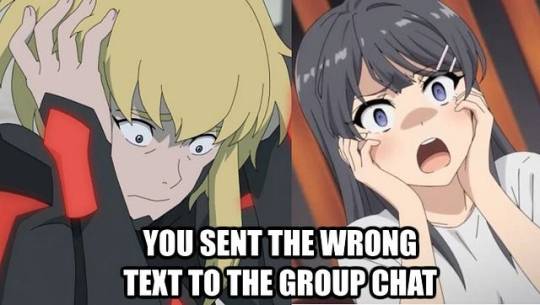
Instead of the lazy as fuck “oh it wasn’t her fault, brainwashed victim” excuse, which is just having your cake and eating it too. Taking 100% agency from her but you get to show her doing evil stuff, that’s convenient.
At least with her choosing to be a villain- this way she has some agency in this genocide situation and the writers would have dodged a bullet.
Why? They wouldn’t have to justify anything as much in terms of trauma if she chose to be a genocidal overlord to begin with. Boom.
There's a better conflict, and Super-Kun would have a legitimate enemy.
But they’re trying to paint her as a victim via brainwashing, so now they just made more work for themselves and they’re not off to a good start with addressing it, because her reaction was so lackluster.
This show since the beginning has been nothing but half-assed, it’s the one thing that’s consistent about it: The mid.
But at the very least, the show means well. That's the best thing I can say about it even now, it's garbage but it means well.
#kara bore-el#mid#my adventures with lois-chan#my adventures with superman#kara zor el#yet#i smell potential#writing#execution#stick the landing#or don't#mid character#clark-kun#genocide#lessermook#rant#kara snore-el
4 notes
·
View notes
Text

Strange Darling - REVIEW
"Strange Darling is a twisted game of cat-and-mouse that thrills with every unpredictable turn, anchored by Willa Fitzgerald’s hauntingly brilliant performance."
Strange Darling is a relentless, stylish thriller that grips you from start to finish. Directed by JT Mollner, this film is a standout in the genre with its inventive storytelling, shocking twists, and remarkable performances. Willa Fitzgerald’s portrayal of the twisted, cunning "Electric Lady" is easily one of the most captivating performances of the year. She brings an eerie, seductive energy to the role that elevates the entire film, carrying both the tension and the psychological complexity of her character. Fitzgerald transforms the movie into something far more than a typical serial killer narrative.
Set against the backdrop of rural Oregon, Strange Darling thrives on atmosphere. The nonlinear structure, divided into six chapters, turns the audience into detectives, constantly piecing together the puzzle of this cat-and-mouse game of murder. The film opens with an almost playful tone—Fitzgerald’s Lady and Kyle Gallner’s Demon engage in what seems like a risky, consensual game of roleplay. However, the lines quickly blur, and the tension explodes when both characters are revealed to be serial killers, setting the stage for a violent, unpredictable chase.
Gallner delivers a strong performance as the Demon, but his character feels secondary to Fitzgerald’s magnetic presence. Mollner’s script turns a seemingly straightforward thriller into something far more complex by flipping expectations: the woman, often portrayed as the victim in these kinds of films, is instead the predator. Fitzgerald effortlessly walks the line between vulnerability and menace, crafting a character who is deeply dangerous but equally compelling. The power dynamics between her and Gallner’s Demon keep you on edge throughout, as each scene flips the script on who holds control.
Shot on 35mm film, the movie’s aesthetic is rich with grainy texture and moody lighting that perfectly complements the dark, rural setting. Giovanni Ribisi, in his debut as a cinematographer, does an exceptional job of making the Oregon wilderness feel both expansive and claustrophobic, heightening the tension in every scene. The choice to shoot on film gives the movie a timeless, almost dreamlike quality, pulling you deeper into its grim, twisted world.
Mollner’s direction shines in his ability to balance brutality with moments of eerie calm. The film’s suspense is masterfully built, as the nonlinear structure allows the audience to slowly uncover each character’s motives and dark past. The brutality is not just physical but psychological, as the film delves into the mindsets of both killers, exploring themes of identity, power, and the corrosive nature of violence. Each twist hits hard, and the final moments of the film leave a lasting impact, refusing to offer a neat resolution.
Strange Darling is a masterclass in tension and atmosphere, a film that respects its audience enough to never spoon-feed its reveals. With Willa Fitzgerald’s electrifying performance at its core, it stands as one of the most original thrillers in recent years. It's a film that lingers long after the credits roll, and one that should be taken seriously by those who appreciate the art of cinema.
Final Score: 9/10
#strange darling#strangedarling#willa fitzgerald#giovanni ribisi#jt mollner#horror#thriller#movie review#movie recommendation#movies#scary movies#horror movie#film
3 notes
·
View notes
Text
Week 4: Digital Community and Fandom
Is Reality TV Scripted? Examining the Manipulation and Editing Techniques Used
Reality TV, with its dramatic conflicts, emotional outbursts, and seemingly unscripted moments, has captivated audiences for decades. It can be defined as “hypervisibility, coalescing over-the-top emotions with behavioral transgressions that promise the thrill of unpredictability” (Kavka 2019). However, the question of authenticity lingers: is reality TV truly "real," or is it carefully crafted with the help of scripts, editing, and producer manipulation? While the answer isn't always clear-cut, exploring the editing techniques and potential scripting employed in these shows can shed light on the constructed nature of reality TV.

The Power of the Edit
Editing plays a crucial role in shaping the narrative of reality TV (C&I Studios 2023). Editing can turn boring footage into drama-filled episodes. Producers are like master chefs, chopping up hours of filming into bite-sized scenes, then rearranging things and adding dramatic music (South University Blog 2016). It's like they have a remote control for real life, rewinding and fast-forwarding to create fake fights, exaggerate personalities, and cook up storylines that wouldn't be in the real world. Remember that contestant you loved to hate? They might have just been edited to look like a villain, thanks to some clever cutting and pasting.

This editing trickery can have real consequences. People watching might start thinking everyone acts like that, leading to unrealistic expectations and unhealthy comparisons. It's like judging a book by its most dramatic chapter, completely missing the rest of the story. This selective editing can create artificial conflict, exaggerate personalities, and fabricate storylines that don't accurately reflect reality. For instance, Mnet, the Korean TV station known for launching K-pop idols, has become a hot topic for all the wrong reasons (Turner, 2023). Their reality shows meant to turn young hopefuls into stars face accusations of "evil editing." Basically, they're using editing tricks to paint certain contestants in a bad position, creating drama and controversy for viewers.
However, it's not the first time fans have been pointing out questionable editing choices for years; this time, things are blowing up (VCCorp.vn 2019). Contestants get hate online, careers are potentially affected, and viewers question everything they see.
youtube
Blurring the Lines: Scripting and Prompts
While completed scripts are rare, reality shows often use "storytelling tools" like producer prompts and leading questions (LinkedIn Film Production n.d.). These interventions can lead participants to specific reactions, guide conversations in a desired direction, and even plant seeds for future storylines. While not outright scripted, these subtle interventions manipulate the flow of events, subtly pushing the participants towards narratives pre-determined by the producers.
Anna Klassen was known for participating in a reality show about makeover transformation. Before her big reveal as a "beautiful and attractive person," producers resorted to some low tactics. They used a cameraman's waxed leg hair (brown hair) to pretend it was her leg hair! When she, understandably confused, pointed out her hair is blonde, not brown, they laughed it off, dismissing it as nothing. The charade exposed the ugly truth for this contestant: “Reality TV is anything but real” (Klassen 2014). It's a carefully crafted narrative where props, manipulation, and forced interactions paint a fictional picture far from the genuine human experience.
However, the ethical implications of these manipulation techniques are complex. While some argue they are necessary to create engaging television, others criticize them for distorting reality and exploiting participants. The line between harmless entertainment and manipulative fabrication can be blurry, raising questions about the producers' responsibility and the participants' informed consent (Mast 2016a).
Conclusion
It's important to acknowledge that not all reality TV is entirely fabricated. Many shows capture genuine moments of human interaction, emotion, and vulnerability. However, the manipulation techniques create a curated version of reality, blurring the lines between genuine behavior and manufactured drama (Mast 2016b). While definitively stating "reality TV is scripted" is an oversimplification, the manipulation of editing, producer interventions, and manufactured drama significantly impact the portrayal of events. Understanding these techniques allows viewers to approach reality TV with a critical eye. So, watch and enjoy, but remember: it's sometimes more accurate than it seems!

References
C&I Studios 2023, ‘The Power of Editing: Shaping the Narrative in Reality TV’, C&I Studios, viewed 3 February 2024, <https://c-istudios.com/the-power-of-editing-shaping-the-narrative-in-reality-tv/#:~:text=Editing%20is%20a%20key%20tool>.
Kavka, M 2019, ‘Reality TV: Its contents and discontents’,Critical Quarterly, vol. 60. no. 4, pp 5-18.
Klassen, A 2014, ‘I Was on Reality TV: Behind the Scenes Secrets of Faking Real Life’, Bustle, viewed 4 February 2024, <https://www.bustle.com/articles/15280-i-was-on-reality-tv-behind-the-scenes-secrets-of-faking-real-life>.
Linkedin Film Production n.d., ‘What are the best techniques for conducting interviews in reality TV shows?’, www.linkedin.com, viewed 4 February 2024, <https://www.linkedin.com/advice/1/what-best-techniques-conducting-interviews-reality>.
Mast, J 2016a, ‘The Dark Side of “Reality TV”: Professional Ethics and the Treatment of “Reality”-Show Participants’, International Journal of Communication, vol. 10, no. 0, p. 22, viewed 2 February 2024, <https://ijoc.org/index.php/ijoc/article/view/2444/1646>.
Mast, J 2016b, Is manipulation within the construct of reality television ethical?, viewed 3 February 2024, <https://ro.uow.edu.au/cgi/viewcontent.cgi?referer=&httpsredir=1&article=4974&context=theses#:~:text=Program%20participants%20are%20encouraged%20to>.
South University Blog 2016, ‘Reality TV — Low Cost Programming that Produces High Ratings’, www.southuniversity.edu, viewed 3 February 2024, <https://www.southuniversity.edu/news-and-blogs/2016/08/reality-tv-low-cost-programming-that-produces-high-ratings-119585#:~:text=For%20example%2C%20if%20a%20cast>.
Turner, J 2023, ‘Evil Editing? Korean Netizens Expose Mnet Producer For Treating “Boys Planet” Zhang Shuai Bo Unfairly’, Koreaboo, viewed 24 December 2023, <https://www.koreaboo.com/news/boys-planet-zhang-shuai-bo-evil-editing-mnet-expose/>.
VCCorp.vn 2019, ‘Liên tiếp phốt to chồng phốt nhỏ, series “Produce” sẽ kết thúc ở mùa giải thứ 4?’, kenh14.vn, viewed 3 February 2024, <https://kenh14.vn/lien-tiep-phot-to-chong-phot-nho-series-produce-se-ket-thuc-o-mua-giai-thu-4-20190904105325671.chn>.
#mda20009#week4#digital community and fandom#realityy tv show#Is Reality TV Scripted?#mnet#evil editing
0 notes
Text
The Green Knight (2021)
(CONTAINS SPOILERS)
The Green Knight (2021), with its excellent cast and feast of visual storytelling, does cut a pretty trailer, but it’s hardly the adaptation we’ve all waited nearly 2 years to see. Rather on the slow side, there is plenty of breathing room (often to excess), but often feels wanting. The performances are well-played, albeit terribly subdued, which create interludes that feel tedious. Dev Patel has proven himself time and again that he has the capacity to play a nuanced lead, and he does well here, but it is the side characters that break the monotony and steal the show, most notably Joel Edgerton (Lord), Erin Kellyman (Winifred), and Barry Keoghan (Scavenger).
David Lowery’s “adaptation” explores the journey of an untested and somewhat undeserving not-quite-Sir Gawain, a far-cry from our Hero in the text, more akin to Prince Hal. This change adds elements to the character with which an audience might more easily identify, and should make this a coming-of-age tale, as well as a moral one; though, this film fails as both.
As a coming-of-age tale, Gawain never quite gets there, and it almost doesn’t matter if he does, because it's not really his tale at all. Nor is this film about morality, not even as a cautionary tale. Perhaps it's more accurate to call it an instance of ‘careful what you wish for’. Gawain doesn’t seem to know what he wants. Does he really want to be a Knight? Is this about living an honest life or living up to familial expectations, particularly your mother's? Hard to say, as many of the female characters, including Gawain’s mother (Morgause and Morgan Le Fay made one), are treated as mystery elements themselves. It’s also not clear just how far her control extends, if it has any limitations. Is there anything in this world that is true?
Perhaps we'll never know his mother's true intentions; it clearly wasn't for her son to be his own person and make his own decisions. A man simply doesn’t become a Legend without his mother’s entire fabrication of the quest, it would seem. Does Gawain feel so out of place in his own story because it’s already set out for him? Was Morgan Le Fay simply Lowery’s segue for the concept of Legend as a set path for Gawain to follow? But as such, Gawain’s tale of morality isn’t what it seems, as he doesn’t even have the illusion of choice. Or was it all just a journey back to nature, back to green? Lowery never lets us forget just what color matters most here. There’s even a fun monologue about it! Even the design of the Green Knight is just a little too on the nose; his appearance essentially being that of an ent.
About 2/3 of the way through, The Green Knight actually shows a hint of promise, but it is short-lived. In case you haven’t already lost interest with the lengthy side quests; everything turns sour at the arrival of Lord and Lady Bertilak’s castle (simply titled Lord and Lady), and what should be the bulk of our story, the “exchange of gifts” and Gawain’s true test of morality. The “exchange of gifts” is glossed over for a taste of something completely different, as it takes major liberties with not only a core part of our tale, but arguably what’s most memorable about the original. It becomes Lowery’s convoluted vision of a different sort entirely, one where Gawain seemingly refuses to take part in his own story. While possibly an interesting take in itself, it does a disservice to the text, and accomplishes nothing other than an attempt to be shocking.
There’s something richer in the “exchange of gifts” simply not explored in Lowery’s version, or the compulsive need to “subvert”, and the film is poorer for it. How can you even subvert something which you refuse to touch upon? It’s also extremely odd and honestly baffling, that in this day and age, homosexual themes and undertones would be downplayed or outright rejected (as they are here), rather than embraced and explored. Altogether, this omission seems a poor choice and a clear indication that Lowery holds little to no affection for the original text. Disregarding the “exchange of gifts”, the journey becomes something vain and hollow; perhaps intentionally, but doesn't serve anyone, least of all the story.
Following the tale’s example, the girdle (sans the accompanying scar) is the all-encompassing symbol for Gawain’s shame, but Lowery takes it a step further, in which he is so seduced by its promise of protection that he literally soils it with his lust. But this scene is so abrupt at the all too brief “exchange of gifts” (in a film that stretches everything to excess) that it seems to lack consideration and its only purpose is to disturb. The girdle furthermore becomes a symbol of his unearned and unholy life (which we’re shown), were he to continue to fail to accept his fate and his test, although this too seems superfluous. What’s interesting here is that in either scenario, Gawain remains undeserving. He is not especially virtuous, he’s not even decent from what we can see, and has failed in almost every chivalric aspect; after all, he is “no knight”. Even so, in the original, even the Green Knight can’t begrudge his lack of fidelity in this one aspect; “because you wanted to live, so I blame you the less”.
A message of The Green Knight seems to be acting out of selflessness as the only indicator of a truly good deed, with no expectation of reward. This is evident in the dismissal of the “exchange of gifts” and Winifred’s admonishment, "Why would you ever ask me that?", but this message is so muddled within the world of the film, that it’s somehow also completely out of place. After all, Gawain is rewarded in a way, with several of his trappings, which are returned to him after being stolen. Speaking of rewards for good deeds, religious themes are also notably lacking, favoring the pagan angle (as expected of A24), though which is never expounded upon. There is the decision to keep some not-so-subtle imagery of crippled Christianity; i.e Gawain’s shield (with Mary’s visage on the inside and a small pentangle on the exterior) and a cross at the Green Chapel.
Lowery gets too hung up on a confused mix of vague and painfully obvious ideas of symbolism and makes huge, unwarranted leaps. His work here reeks of self-indulgence, to the point of parody. It’s also simply never clear what anyone’s intentions are, his least of all. His ideas are so flighty and changeable that contradictions abound in the finished product (It’s clear why he needed all that extra time to re-cut). The whole thing is so nebulous that it may fool some into thinking it’s beyond their grasp, but it just reads as pretentious. The thing is, The Green Knight tries to be too many things at once, and in doing so, fails at all of them. Lowery lacks the conviction to support anything he presents and has no sense of narrative structure. Simply put, this film lacked proper direction and would have greatly benefited from fresh eyes on the script.
The Green Knight may question 'What is Honor and if it does exist, what is it worth? For even if there comes a time to prove yourself for Honor’s sake, what is it all for? “Is this all there is?”’, but Lowery drops the concept of Honor as soon as he picks it up and chooses to explore Legacy and Legend, and while it leads us on an interesting journey of interpretation, it’s very heavy-handed. It’s also difficult to answer any of these questions because Gawain is simply not worthy of anything. It’s not just that he is imperfect; he is not good and never acts out of selflessness or for the actual sake of Honor. He doesn’t know the meaning of the word. The original text asks us to stay true, true to our word and our values, in uncertainty and despite our fears (as a Good Knight should, and which Gawain ultimately is.) Lowery, on the other hand, begs us to forget the narrative, because he doesn’t know how to do it, and the search for meaning, because there is none. I’m not even sure he knows what he’s made.
Overall, though heavily burdened by its sluggish pace and lack of structural integrity, The Green Knight, at least on the surface, appears to be a somewhat earnest attempt at exploration within the fantasy/horror genre, asking a lot more questions than it answers. But while its visuals may dazzle, it’s a cold and unfeeling thing, devoid of all charm of the original tale, and can hardly be called an adaptation for many of its choices.
Source: https://letterboxd.com/avega007/film/the-green-knight/
(I wasn’t expecting to go off when I just got a letterboxd, but this film left me heated.)
#the green knight#sir gawain and the green knight#david lowery#dev patel#I really wanted to like it#but it disappointed me#spoilers
15 notes
·
View notes
Text
“Shifting” TikTok Trend - Shifting or Maladaptive Daydreaming?
“Shifting Realities”

Reality Shifting is a term used for someone going into a meditative state in which they can literally shift themselves into another reality, a TikTok trend living under the hashtag “Draco Malfoy” which has been drowning in videos of teens discussing their methods of shifting and how they are married to the character Draco Malfoy.

The shifting community has been around since the beginning days of fanfiction sites such as Wattpad as well as the social media site Tumblr. The community is mainly made up of girls in their teens however it does branch out to young adults who have grown up in the community but it has made a mass resurgence through the popular site TikTok.
Participants will write out “scripts” or prompts for themselves to follow in their shift. This can be made up off their “other self’s” hair colour, eye colour, favourite food, favourite colour etc. that helps them add detail to the desired reality as well as what their goal is when they enter this DC (desired reality). The participant will enter a meditative sate by using breathing techniques, certain playlists or even certain locations so that they can enter and exit the desired reality in a safe and peaceful manner. This can be comparable to lucid dreaming however this is often met with anger and disgust by the community who insist that this it is a more spiritual experience that lets them enter the real Hogwarts world at will.





“Maladaptive Day-dreaming”?
“Maladaptive daydreaming is not only temporally associated with adverse outcomes, including obsessive-compulsive and anxiety symptoms, but is also associated with a high comorbidity rate with a number of psychiatric disorders, including anxiety and obsessive-compulsive disorders. Maladaptive daydreaming is distinct from general mind wandering mainly because it focuses on structured, intentionally-generated fantasy narratives, whereas mind wandering is broader and includes fleeting thoughts and imagery that seemingly come up spontaneously and relate to the person’s daily life, although some conceptualizations of mind wandering also includes guided thoughts.” (A daily diary study on maladaptive daydreaming, mind wandering, and sleep disturbances: Examining within-person and between-persons relations)

Maladaptive Daydreaming is a much disputed psychological condition in which the patient will slips into a daydream-like state after being triggered and will lose track of time as well as the world around them. This is often thought to be the individual’s response to trauma and their ability to cope with it. Maladaptive daydreaming is also often associated with OCD, depression and ADHD.
The individual does not do this through choice but is rather pulled into a daydream which can last for any extended period of time. This can affect their life by disrupting sleep patterns, stopping them being able to complete daily tasks or even stop them functioning at a neurotypical level.

“Maladaptive daydreaming usually occurs as a coping mechanism in response to trauma, abuse or loneliness. Sufferers create a complex inner world which they escape to in times of distress by daydreaming for hours. It is a vicious cycle of addiction; maladaptive daydreaming inevitably creates an emotional attachment to the characters and the life created, which often replaces the painful real-life interactions between family and friends. It also interferes with studying, working and looking after one’s hygiene and wellbeing, which then further hinders daily functioning. At this point, daydreaming about a fulfilling life is a more appealing than dealing with the depressing reality. The defining difference between maladaptive daydreaming and psychosis is the fact that the individual knows that their daydreams are not real.” (The Psychologist).
Whilst many of the shifting community insist that these are two separate things and shifting is a very real ability than many share, the link between the two cannot be ignored. Repeated shifting can be seen as a complete avoidance of the CR (current reality) and lead to an addiction to daydreaming or ‘reality shifting’ because the individual will form attachments to the characters within their daydream as often they are as vivid as the person standing in front of you; or because that reality offers a complete escape from their CR. The daydreamer does not have complete control over the world they see and nor does a shifter, both are in control of themselves within that world and will seek to disappear into it entirely through no fault of their own a this world is more appealing to them as they try to escape whatever unpleasant reality that are currently living in.
Why is all of this relevant?
I have researched these topics as this could be an issue with a virtual reality product such as mine. The product will offer complete immersion and bring to life whatever reality or daydream the user yearns for and could lead to it being used addictively or as a coping mechanism to avoid the unpleasant reality around them. The product offers the perfect escape however could it give way to an addiction?
“There is a growing body of evidence identifying dysfunctional forms of imaginative involvement, defined as maladaptive daydreaming (MD), which may be expressed through extensive book-reading, watching films, or gaming. MD refers to extensive, often compulsive, absorption in fantasy for several hours a day, which replaces human interaction and impairs functioning in various domains: academic, interpersonal, or vocational (Somer, 2002, 2018). This syndrome was found in patients with a wide range of DSM-5 disorders, including attention-deficit hyperactivity disorder, anxiety disorder, depressive disorder, and obsessive–compulsive or related disorders (Somer, Soffer-Dudek, & Ross, 2017). Somer (2002) initially associated MD with dissociative pathology and personality disorders. More recently, however, he described this behavior in relation to four categories: a dissociative disorder, disturbance of attention, obsessive–compulsive spectrum disorder, or behavioral addiction (Somer, 2018). Maladaptive daydreamers may share certain similarities with problematic Internet gamers who play games to avoid real-life difficulties (escapism), and use fantasy to experience things that are not workable in real life or live out alternative identities through the game (Ballabio et al., 2017). Escapism, according to Demetrovics et al. (2011), should be distinguished from coping (i.e., improvement of mood or channeling of aggression), which has no clear relationship with problematic gaming. MD could be considered a behavioral addiction, because it is so rewarding that people experience intense yearning for it or feel compelled to extend and repeat this action.” (Maladaptive daydreaming as a new form of behavioral addiction)
Relevant Links
- i-D Vice article
- Maladaptive daydreaming
- Quora Question
2 notes
·
View notes
Text
“The Matrix Reloaded” deserves a re-watch in 2020

Here’s a burning hot take for, y’all; “The Matrix Reloaded” is not bad actually!
In fact, it’s more than not bad, it’s actually pretty good and perhaps a bit misunderstood by the fans.
Now, I’m not here to tell you it’s the best Matrix film. That honor will remain always and forever with the first movie, as it remains not just one of the best action films of all-time but one of the best science fiction films ever, period. It’s a classic and simply one of my all-time favorite films.
youtube
(Not to mention turned me into a Rage Against The Machine fan.)
But somehow, over the course of my lifetime, you know what movie I have watched exponentially more than “The Matrix?” The fucking “Matrix Reloaded!”
I used to think maybe it was an ironic infatuation. To a certain extent, I think it still is, as its overly indulgent action, bad lines at times, cringey new characters, and over the top moments can make it about as comical as many so bad it’s good movies. But growing up time can change perceptions, sometimes for the better, and can help you see things in new ways that you didn’t before and “The Matrix Reloaded,” especially this year, was one of them for me.
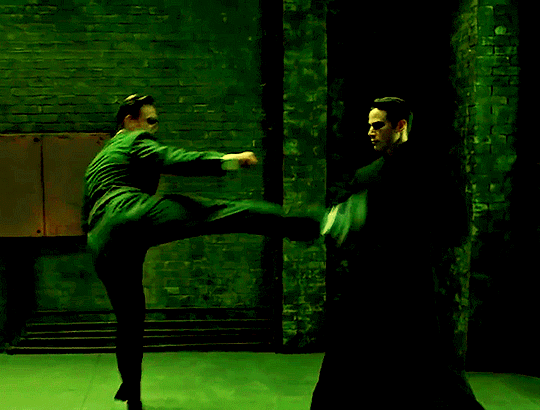
(My plans vs 2020)
I could defend the much controversial sequel by going in on its ambitious action film-making (the car chase is still my all-time favorite in any movie), pulse-pounding score, or its eye-popping cinematography that, honestly, holds up even to today’s standards but I think these are all things that even the film’s detractors generally agree on.
No, I’m going to defend this film by talking about its most controversial scene: The Architect room.
I can hear the groans already and I don’t blame you. I found this scene preposterous and mightily confusing when I first saw it.
“The One is actually a part of the Machines’ system?? WTF!?”
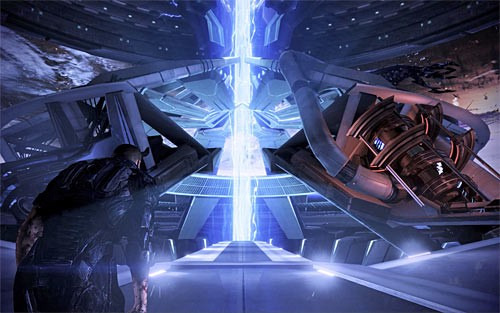
(I remember having a similar feeling after playing Mass Effect 3...)
To be fair, its set up is a bit muddled, given the clunky script and pacing issues of the movie but when you start thinking about the message more deeply, given current events, and its relation to the real world it hits about as hard and fits as neatly as the first film’s more positive message.
The first Matrix film has a pretty dark setup, obviously. Neo finds out that he’s a part of gigantic computer program meant to create the illusion of free will for humanity while they are quite literally eaten for power by the Machines like cattle. Of course, Neo discovers he’s more than just another human connected to The Matrix but a prophesized messiah who has the ability to combat the system beyond its considerable control. By the end of the film he fulfills his destiny by becoming The One and beginning a new revolution against the Machines that control the human race.

(And looking fucking cool and totally 90s while doing it!)
It’s a pretty positive and uplifting story when you really break it down. It shows the viewer the lengths at which power tries to maintain its control and the Machines are a worthy avatar for this metaphor, but it also shows that power can be fought against when someone begins to empower themselves. When Neo says he will “show you a world where anything is possible” at the end its an earned moment of catharsis for not just him but the audience as well. We begin to start to believe in hope and beating the system too.
“The Matrix Reloaded” however goes several steps further showing that power can maintain its control in far more nefarious ways. Throughout the film Neo is told about the illusion of control and choice by characters like The Oracle and the, admittedly cringey, Merovingian. It feels strange at first because Neo is supposedly someone who is above the system but you can tell there is sense of jadedness, with some optimism of course, when The Oracle explains his role in saving Zion, like someone who has seen someone try to do this before, and The Merovingian simply mocks him for being another in a long line of “predecessors” who is completely “out of control.”
But then Neo finally does get to the Architect after being led there by The Key Maker and it’s here he learns his true nature; that he is the sixth in a long line of previous “Ones” in the Matrix and a part of The Machine’s control. He is less a prophet and more just another cog in the machine meant to lead humanity in one direction over and over again in order to create an illusion of free will for the resistance, the same way The Matrix does its human cattle.
Neo was a part of their plan and had been from the start.
youtube
youtube
(In case y’all need a refresher...)
There were tons of fans, including myself at one point, who couldn’t square with this strange narrative turn. Like Morpheus at the end of the film, there was refusal to believe it. It seemingly rewrote how one could view the first film and Neo’s role in it.
It changed the way a lot of people could see the positivity of the first film and understandably that could, and did, make a lot of people upset. Neo wasn’t sent to save humanity; he was there to keep them in line. It was like saying “actually Emperor Palpatine always wanted Luke Skywalker to blow up the Death Star.”

(I mean he does say this a lot though...)
But “The Matrix” was always about the lengths at which power works to maintain its control over the masses and “Reloaded” asks how can a corrupt and evil system be a part of the solution? How can it be reformed?
It can’t.

Way back in 2008, I cast my first vote as an eligible American for Barack Obama for president. Like many millennials at the time I found his mantra of “hope and change” sincere and uplifting and I truly felt the country was going to take a turn for the better the night he was inaugurated. For a moment it really did feel like things would be different after eight years of Bush.
Fast forward to 2011 however, and things changed dramatically for myself when I found out about the drones.
I’m aware of the fact that in leadership positions hard choices are made but after spending the previous decade vociferously calling out the Bush Administration for what they did in the Iraq and Afghanistan Wars this was a truly rude awakening for me. Combine this with finding out about him continuing Bush era tax cuts, re-upping the Patriot Act, the mass deportations, the major corporate donors, his mishandling of Flint, and The Standing Rock Crisis it became clear Obama was just as much a part of the machine as Bush was.
youtube
(Also, no matter how much you hate Trump, DO NOT participate in the the gas-lighting of this man’s record...)
Now, I can already hear the pitchforks picking up and I’m not here to tell you that the Obama presidency didn’t have its moments or that it was worse than what we have now BUT this does not excuse what would be considered awful behavior by liberals under any conservative president.
Each Democratic presidency or nomination I’ve seen in my lifetime, from Clinton to Obama, has always touted themselves as a chance to “fix America” and bring “hope and change” to a largely corrupt system. But neither of these presidencies really changed much of what the previous conservative administrations did, in fact in some ways they got worse. Minimum wage hasn’t risen in over a decade, we still have the world’s largest prison population by far, the wealth gap has only INCREASED regardless of who held the White House, and need I remind some of you Black Lives Matter started under the Obama administration.
At some point the problem goes beyond just conservative stonewalling and political impasse. You can’t blame everything on Mitch McConnell (though a lot of it can too, admittedly). The system is behaving exactly as its supposed to because corrupt people hold power.

(They’re not laughing with you, they are laughing AT you...)
The extremely cynical Biden-Harris ticket we got going right now is being pitched, more or less, the same way as a "fight to fix everything terrible” that Trump has done. Look, I’m not going to tell you Trump hasn’t been terrible because that should be obvious to EVERYONE at this point, but when you have Wall Street goons actively cheering the announcement of the Democratic party nomination, a DNC that is running more conservative speakers in its first day than Latinx across the entire event, you have to wonder to yourself if they are really “The One.”
youtube
(A reminder that “Never Trump” Republicans are not your friends either...)
Again, I’m not saying things can’t be “better” right now under a Democratic White House or that some communities would benefit greatly from a change in leadership BUT the bar is FUCKING LOW and the truth of the matter is people WILL be hurt under the next administration regardless of who it is and framing it as “privileged” to think otherwise is actually quite privileged itself.
There are people who can’t wait for medicare for all. There are people who can’t wait for sentencing and prison reform. There are people who cannot survive another wave of US imperialism overseas.

We are being guided to the same predetermined destination that The Architect gives Neo and its what makes all this so aggravating for many.
“The Matrix Reloaded” shows Neo that he is simply another system of control for the afflicted masses but what makes the final moments of the film important is that he chooses to stop playing its game. When The Architect gives him the choice of the door that guarantees the “salvation” of the human race but in bonded servitude to the Machines and the door to make the supposed “selfish” decision to save Trinity from death but doom humanity to extinction, he does this fully expecting Neo to make the same choice every other One did before him did.
But Neo doesn’t, he goes through the door to save Trinity and for a chance to destroy the system in another way. Neo decides to break the cycle even if it might have catastrophic consequences. He challenges The Architect on whether he would be willing to allow Neo any chance at any other outcome and calls his bluff. It’s what makes him a hero and in a strange way gives “Reloaded” a positive ending as well.

(And again, just looking cool as hell while doing it.)
Now, with the way the next movie ends you could make the argument that the cycle continues and this theme gets contradicted but I would argue it’s a bit more ambiguous than that and with the fourth film supposedly on its way in the coming years there is a chance for a more conclusive and satisfying ending. This write-up is strictly arguing the message of the second film anyways.
What a viewer should get on further review of “The Matrix Reloaded” is that corrupt systems have more insidious ways of maintaining control than we may be able to accept. Wall Street goons wouldn’t allow a consistent formidable opposition party to run against them every year, it’s why they are deep in both red AND blue pockets. It’s why campaign financing is out of control. It’s why ultimately both wings of our government are pro-surveillance, pro-big money donors, pro-US exceptionalism/imperialism and the only real difference comes down to mostly minor minutia between the two to maintain their illusion of choice.
In the end to a certain extent, I still believe in the system, given that I donate money and support various leftist causes, progressive primary challenges, and reelections around the country in hopes they run a real left wing someday. However, each year, and frankly each month at the rate we’re going, I’ve grown more cynical about it. At best it is incremental change and at worst its ultimately empty power against the larger juggernaut of corrupt politics throughout our government.

(Me desperately trying to avoid the relentless bullshit of this year.)
“Reloaded” deposits that in order to break the cycle you have to make a choice not accounted for by the system. That in order to truly change anything, as silly and as obvious as it sounds, you have to do something different. Voting for people who better represent your beliefs much more fully and refusing to vote for ones who don’t is one way but as I stated in my “Black Sails” write-up the more active third option should never be off the table.
Changing the world shouldn’t come down to a false binary choice like the ones the Machines gave Neo at the end of “Reloaded.” And while, for the record, I’m not necessarily against people making the lesser of two evils choice again, people need to stop ignoring the ways in which corruption keeps its power and start having honest looks at those who call themselves “The One” who will make things right.
If this entire year hasn’t convinced you of that yet, I don’t know what will and the sooner we understand this the sooner we can start a real “revolution” in this country’s cynical politics.
Until then The Machines will continue to win...
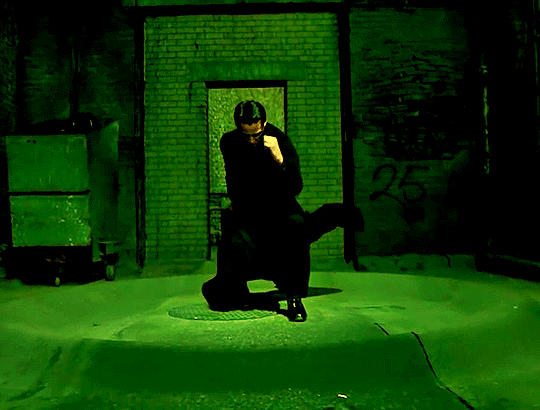
*Me getting away from the liberal bullshit that will likely be tossed at me over this*
#The Matrix#The Matrix Reloaded#the matrix revolutions#Matrix#the wachowskis#The Wachowski sisters#Trans rights#LGBTQ#politics#George floyd#black lives matter#BLM#leftist#black sails#keanu reeve#carrie anne moss#laurence fishburne#agent smith#movie#film#review#Pop Wasabi#essay#obama#bush#clinton#mass effect#mass effect 3
11 notes
·
View notes
Text
Let’s try this again
They should make a law where if the police don’t read you your Miranda rights you get out of jail free, like if you don’t get your receipt at fast food restaurants you get a mail free
The shaggy law - There should be a law that if you continuously and shamelessly deny doing something, no matter how indisputably obvious it is that you did it, you should get off free for pure savegery.
Confederates as “rebels for tradition” is laughable
Ram rainbow spiral horns profile.
People think grammar rules are etched into the universe — they’re not. When people say AAve is incorrect and ignorant, they say that their conception of how one should speak is inherently correct despite no evidence/truth. Grammar is agreed upon not mandated
Hippie sauce infusion pizza joint
Plain nude balconette with little purple and pink flowers at wiring
How could anyone predict anything happening but how could any be surpised either
Hierarchies - nahhhh
Humans aren’t inherently higher than any other creature or thing, but as humans i don’t think it’s wrong to prioritize other humans. There no better or worse but there is optimal for certain environments and lifestyles.
What differentiates a piece of art from a slightly different replica - when is it an entirely different piece altogether? Moving a figure slightly? Adding a splash of paint ? Changing a color to the point where no one could tell? Is the persons perception the deciding factor or what’s actually on the canvas. If abstract art is about the perception, and the waning behind it - does it change with these things?
An exhibit where people are invited to paint over and destroy or change the art
The differences between us and other. Are feeble - not illusory but
Periwinkle sky blue black and white each of a half circle . Faded out
Uni should be about exploring ideas — new and old famillar and foreign - honeing writing reading reasoning debating listening etc skills.
Umm, Karen were your parents married when you were born?
Ummmm no, umm i mean , uh ,yes —what??
Then why are you policing what other people do?
Dark blue light blue orange lemon circles layer on top of each other, several difffent sizes
Job apps tip!! For every job you apply to , Change your last name on your resume to the last name of the hiring manager and they will think you are related to them and hire you with nepotism. ( then, or coarse, legally when you get the job)
Unpopular opinion: i don’t really mind diarrhea
I for one think it’s incredibly brave of the brats girls to reclaim such a derogatory term
Starting every Describtion of every British show with “its kind of like skins but..”
Beanie baskin took that treat she snatched it - she ain’t even askin
The squad bod - a group of ghost friends share one body in which they have to live their lives -
My playlists are a matter of fact, not opinion. They reveal truths about the human experience
A cats gorilla imeritive of aesthetics.
I don’t chose them, they are not for joy but for truth. They are not intelligible but feel able
📝 narrative - longing
👼 chaotic
🌾 childlike wonder
Things that seem homo and phobic ATST
- Woodstock
- Brown eyed girl
Life has a funny way of sneaking up on ya when you think everything BG a gone wrong and everything bows up in your face
If women can’t do drag because they have an advantage then what is drag? Is it having good looking tits and a waist ? Looking like woman? or is it about having charisma uniqueness nerve and talent?
Examining Tik toks through different philosophical lenses
What makes it so they put parenthesis around lyrics in a song? What intonations and such make it parenthesis worthy
What’s an article of clothing from your childhood that you viscerally remember for seemingly no reason
I feel like the problem with the property brothers is they had too good of a childhood
Do you ever wonder if personality traits would be diffferntnin different cultures? Would a quiet person be even quieter if they were brought up in North Korea? Or the same amount of talkativity? Do we have the traits no matter what, or are we inclined to be more of one way than the others around us. Are personality traits created by comparison to those around?
Maybe the anxiety comes from knowing your not “supposed” to be as quiet as you are. You don’t really want to talk, that’s okay , but it’s expected that you do. So you are anxiety that your not living up
I find happiness every single day
This feeling has made me so appreciative of my mental state usually. How many people feel like this on the regular? How many people have this as their default? I am so lucky. My default is happy. I have my issues, but i need to appreciate the gift i was given. I was given elation. Childlike wonder. Curiosity. Adventurousness. Self completion and fullness. The rest will come.
If you see a celebrity you want to talk to in public but don’t want to bother them, make sure they don’t see that you saw them and start a fake conversation telling a friend that they should buy a product they are a sponsor for, and that they should use their coupon code. When they approach you to thank you for being such a loyal fan, obviously pretend to be shocked that they just so happened to be there
Christianity excuses selfish politics and beliefs
Things i never would’ve noticed if they weren’t pointed out to me:
-Left and right handed ness
Rating sports teams by uniform colors
Balloon animals but make it clothing!
Logics doesn’t care about your feelings, but it certainly cares about your biasees.
He who findeth keepith, whilst he who loosith weepith.
Religious thought often starts at the conclusion they want and attempts to make arguments justifying it.
Jewish debate starts with an agreement that we are going to follow the book, but argues about what the book truly says. Not good enough when you are still just following the book
Why did Jesus need to die for our sins
Dream - swimming in a lake and bump into something you think is a human tying to save to but is it! Oct 29 9:03
Candle company logo etc
I’m sorry for your loss
It’s not oka
If people can accept that stupid bad jokes can be
Is there a reason for each thing existing? Sufficient reason
Understanding if an area is a matter of perspective or fact? Is it Emperical ?
If you assume you have free will you limit your critical thinking ability and therefor stour actual free will - you need to navigate technology such as algorithms that show you why at you want to see or you completely loose free will - you cannot chose when you don’t even know a choice. there is Somthing controlling you
Revelation is within it doesn’t involve others - can happen in a moment
Revolution- requires work and years and years of convincing others m
What counts as a second chance? What counts as a first chance? What does giving someone the benefit of the doubt entail ? Letting them out of jail , or letting them have a 2nd term as president.
**Picture of coke or Pepsi book**
Trump supporters be like: THIS is the BALLOt sleepy crooked joe SEND to MY neighbor. So much FOR democracy
One flew over the coup coups nest
Ashge-nazi = Jewish trump supporter
The heathers of the USA are Cali, New York and Texas. Florida, too
Shape shifting would solve all of this. I could go to Washington DC, pretend to be trump, concede then leave. It would be hilarious, however if me and trump looked identical and had to so the most idiotic crazy shit to prove to America that we indeed are the true DJ.
Coup busting outfit - light cute short sleeve camo shirts , army green super utalitarian cargo pants , double sash belts in leather with grommets studs or spikes (to be decided by team (with democracy) or left up to the individual) leather (vegan available) lace up knee high boots (maybe with spikes if not too 2012) and the pies de resistance two army green denim shoulder high gloves that fold down as far as needed for the comfort of the fighter. Will be adorned with patches decided by the wearer. Edges will be frayed to honor to the coup busting aesthetic and spirit of the endeavor. We can decide on a signature lip color, but spf is required for all fighters. Of coarse we will have those football stripes below the eyes, don’t be stupid.
How far away can something be from a face and still have humans think it’s a face
Senator Portman - i hope you are well, and want to thank you for the hard work you have put in to this election. However, it has become abundantly clear that joe Biden and Kamala Harris have secured more than enough electoral and popular votes to warrant recognition as president and vice elect. Upon reading the transcripts of he hopeless court cases, there is absolutely no evidence of vote measurable fraud. is time you stand up for democracy and face reality by congratulating he pair on their success. Americans and scared and they need a powerful republican voice to demounce the unsubstantiated conspircy theories that attempt to thwart democracy in this beautiful county. Please do the right thing , and stand with sanity, freedom and democracy. History books and citizens will thank you. May god bless you, your staff and loved ones
Could mermaids exist through evolution in the future
Me learning about real us history - all the nations destroyed by the USA—- I’m the baaad Guy
The rest of the world - duh dodododosodo
Print that looks like a page of writing that has been sourced in water so it’s bleeding and darker in speckles
Zamps= examples
Clothes with green screen cut outs
Robots don’t need to be sentient to destroy us.
Navy mock neck long sleeves big orange and little white stripe on tube cage sides
A veritcal line stretch waistband
Cross cross and straps back
Square high neck
Scarlet polka dots around can light blue text and beach image as front
Blue stroke red inside square, blue triangle rainbow with eye and funky font
Y either know a particular topic or not , but it’s hard to pin down intelligence on one category
Cream background , ice cream pink script name kinda bev hills hotel script looking ish
Move your mouth in a differ way
Supersonic vibrating butt cleaner
Half magenta half red violet a blue teacup in the center with white floral frills thick serif font
Pink background am orange flower in a vase white present ribbon n red as a table
An app that familiarizes people with science - through experimental learning ― hands on experiences that make it seem less top down and authoritarian , and more like a set of steps that we take, things that anyone can do to get closer with nature and the world
A social media philosophy app - teaches what others said and gives people a chance to express their views , postulate, argue, etc gadfly? How would be avoid a shit show, how can we make social media more humanitarian. how can we care about people while also expressing deeply held ideas , how can we encourage users to examine their deeply held ideas without alienating them. How can we discourage hatred and abuse and groupthink with design? How do we slow people down and encourage them to recognize the human behind the screen. Street epistemology? Socratic dialogue?
Socrates - asking questions. Breaking it down to bits. Deeply understanding their argument. Asking about different possibilities and circumstances. Take vast assumptions and show scenarios that make go against them.
Build fact checking into apps
Narrative self vs experiential
Walks you through steps of the sciefitifc method and encourages you to explain how you feel each step actually helped you- then walks you through a scientist doing the same for their reasarch
Republicans only want to be free in the specific ways that benefit corporations
Are Christians more willing to support the death pen early because they already believe in the cruel and overstepping punishment of hell?
Where did the idea come from that you need to remain impartial when trying to persuade
The idea that there is someone in a similar but different dwelling, hearing similar but different sounds and feeling similar but different feelings is wild
We synthesize sets of traits, and particular actions in a super biased culturally constructed way
With the way we see things as humans- we categorize things into groups that aren’t really reaaal ― paratheletic groups
I just want the people and jobs that benefit society
Connection to nietzsches Dionysian art and eckheart tolle/Taoism
No matter your personality, there is probably a part of the world that you would fit in with naturally.
An ordinary girl is selected as one of the representatives of earth in the first meeting of various alien species after one advanced planet discovered and United 10. Confused as to why she was chosen, she goes on her journey meeting
Wha ba Bada da da da da dada he’s a wha ba ba dadada as a matter of fact it’s not my fault if you came up here thinking that you would win
Wanting to break boundaries and rules for the sake those who are hurt by the rules
You are imagining the best case scenario of the life you want to have and experience Ming the reality of the life you so have.
Yes her drips cosmetics line to students i. Class
Chez it people can goldfish people
Your personality flows where a system needs it to go to maintain balance
1 note
·
View note
Text
Let’s try this again
They should make a law where if the police don’t read you your Miranda rights you get out of jail free, like if you don’t get your receipt at fast food restaurants you get a mail free
The shaggy law - There should be a law that if you continuously and shamelessly deny doing something, no matter how indisputably obvious it is that you did it, you should get off free for pure savegery.
Confederates as “rebels for tradition” is laughable
Ram rainbow spiral horns profile.
People think grammar rules are etched into the universe — they’re not. When people say AAve is incorrect and ignorant, they say that their conception of how one should speak is inherently correct despite no evidence/truth. Grammar is agreed upon not mandated
Hippie sauce infusion pizza joint
Plain nude balconette with little purple and pink flowers at wiring
How could anyone predict anything happening but how could any be surpised either
Hierarchies - nahhhh
Humans aren’t inherently higher than any other creature or thing, but as humans i don’t think it’s wrong to prioritize other humans. There no better or worse but there is optimal for certain environments and lifestyles.
What differentiates a piece of art from a slightly different replica - when is it an entirely different piece altogether? Moving a figure slightly? Adding a splash of paint ? Changing a color to the point where no one could tell? Is the persons perception the deciding factor or what’s actually on the canvas. If abstract art is about the perception, and the waning behind it - does it change with these things?
An exhibit where people are invited to paint over and destroy or change the art
The differences between us and other. Are feeble - not illusory but
Periwinkle sky blue black and white each of a half circle . Faded out
Uni should be about exploring ideas — new and old famillar and foreign - honeing writing reading reasoning debating listening etc skills.
Umm, Karen were your parents married when you were born?
Ummmm no, umm i mean , uh ,yes —what??
Then why are you policing what other people do?
Dark blue light blue orange lemon circles layer on top of each other, several difffent sizes
Job apps tip!! For every job you apply to , Change your last name on your resume to the last name of the hiring manager and they will think you are related to them and hire you with nepotism. ( then, or coarse, legally when you get the job)
Unpopular opinion: i don’t really mind diarrhea
I for one think it’s incredibly brave of the brats girls to reclaim such a derogatory term
Starting every Describtion of every British show with “its kind of like skins but..”
Beanie baskin took that treat she snatched it - she ain’t even askin
The squad bod - a group of ghost friends share one body in which they have to live their lives -
My playlists are a matter of fact, not opinion. They reveal truths about the human experience
A cats gorilla imeritive of aesthetics.
I don’t chose them, they are not for joy but for truth. They are not intelligible but feel able
📝 narrative - longing
👼 chaotic
🌾 childlike wonder
Things that seem homo and phobic ATST
- Woodstock
- Brown eyed girl
Life has a funny way of sneaking up on ya when you think everything BG a gone wrong and everything bows up in your face
If women can’t do drag because they have an advantage then what is drag? Is it having good looking tits and a waist ? Looking like woman? or is it about having charisma uniqueness nerve and talent?
Examining Tik toks through different philosophical lenses
What makes it so they put parenthesis around lyrics in a song? What intonations and such make it parenthesis worthy
What’s an article of clothing from your childhood that you viscerally remember for seemingly no reason
I feel like the problem with the property brothers is they had too good of a childhood
Do you ever wonder if personality traits would be diffferntnin different cultures? Would a quiet person be even quieter if they were brought up in North Korea? Or the same amount of talkativity? Do we have the traits no matter what, or are we inclined to be more of one way than the others around us. Are personality traits created by comparison to those around?
Maybe the anxiety comes from knowing your not “supposed” to be as quiet as you are. You don’t really want to talk, that’s okay , but it’s expected that you do. So you are anxiety that your not living up
I find happiness every single day
This feeling has made me so appreciative of my mental state usually. How many people feel like this on the regular? How many people have this as their default? I am so lucky. My default is happy. I have my issues, but i need to appreciate the gift i was given. I was given elation. Childlike wonder. Curiosity. Adventurousness. Self completion and fullness. The rest will come.
If you see a celebrity you want to talk to in public but don’t want to bother them, make sure they don’t see that you saw them and start a fake conversation telling a friend that they should buy a product they are a sponsor for, and that they should use their coupon code. When they approach you to thank you for being such a loyal fan, obviously pretend to be shocked that they just so happened to be there
Christianity excuses selfish politics and beliefs
Things i never would’ve noticed if they weren’t pointed out to me:
-Left and right handed ness
Rating sports teams by uniform colors
Balloon animals but make it clothing!
Logics doesn’t care about your feelings, but it certainly cares about your biasees.
He who findeth keepith, whilst he who loosith weepith.
Religious thought often starts at the conclusion they want and attempts to make arguments justifying it.
Jewish debate starts with an agreement that we are going to follow the book, but argues about what the book truly says. Not good enough when you are still just following the book
Why did Jesus need to die for our sins
Dream - swimming in a lake and bump into something you think is a human tying to save to but is it! Oct 29 9:03
Candle company logo etc
I’m sorry for your loss
It’s not oka
If people can accept that stupid bad jokes can be
Is there a reason for each thing existing? Sufficient reason
Understanding if an area is a matter of perspective or fact? Is it Emperical ?
If you assume you have free will you limit your critical thinking ability and therefor stour actual free will - you need to navigate technology such as algorithms that show you why at you want to see or you completely loose free will - you cannot chose when you don’t even know a choice. there is Somthing controlling you
Revelation is within it doesn’t involve others - can happen in a moment
Revolution- requires work and years and years of convincing others m
What counts as a second chance? What counts as a first chance? What does giving someone the benefit of the doubt entail ? Letting them out of jail , or letting them have a 2nd term as president.
**Picture of coke or Pepsi book**
Trump supporters be like: THIS is the BALLOt sleepy crooked joe SEND to MY neighbor. So much FOR democracy
One flew over the coup coups nest
Ashge-nazi = Jewish trump supporter
The heathers of the USA are Cali, New York and Texas. Florida, too
Shape shifting would solve all of this. I could go to Washington DC, pretend to be trump, concede then leave. It would be hilarious, however if me and trump looked identical and had to so the most idiotic crazy shit to prove to America that we indeed are the true DJ.
Coup busting outfit - light cute short sleeve camo shirts , army green super utalitarian cargo pants , double sash belts in leather with grommets studs or spikes (to be decided by team (with democracy) or left up to the individual) leather (vegan available) lace up knee high boots (maybe with spikes if not too 2012) and the pies de resistance two army green denim shoulder high gloves that fold down as far as needed for the comfort of the fighter. Will be adorned with patches decided by the wearer. Edges will be frayed to honor to the coup busting aesthetic and spirit of the endeavor. We can decide on a signature lip color, but spf is required for all fighters. Of coarse we will have those football stripes below the eyes, don’t be stupid.
How far away can something be from a face and still have humans think it’s a face
Senator Portman - i hope you are well, and want to thank you for the hard work you have put in to this election. However, it has become abundantly clear that joe Biden and Kamala Harris have secured more than enough electoral and popular votes to warrant recognition as president and vice elect. Upon reading the transcripts of he hopeless court cases, there is absolutely no evidence of vote measurable fraud. is time you stand up for democracy and face reality by congratulating he pair on their success. Americans and scared and they need a powerful republican voice to demounce the unsubstantiated conspircy theories that attempt to thwart democracy in this beautiful county. Please do the right thing , and stand with sanity, freedom and democracy. History books and citizens will thank you. May god bless you, your staff and loved ones
Could mermaids exist through evolution in the future
Me learning about real us history - all the nations destroyed by the USA—- I’m the baaad Guy
The rest of the world - duh dodododosodo
Print that looks like a page of writing that has been sourced in water so it’s bleeding and darker in speckles
Zamps= examples
Clothes with green screen cut outs
Robots don’t need to be sentient to destroy us.
Navy mock neck long sleeves big orange and little white stripe on tube cage sides
A veritcal line stretch waistband
Cross cross and straps back
Square high neck
Scarlet polka dots around can light blue text and beach image as front
Blue stroke red inside square, blue triangle rainbow with eye and funky font
Y either know a particular topic or not , but it’s hard to pin down intelligence on one category
Cream background , ice cream pink script name kinda bev hills hotel script looking ish
Move your mouth in a differ way
Supersonic vibrating butt cleaner
Half magenta half red violet a blue teacup in the center with white floral frills thick serif font
Pink background am orange flower in a vase white present ribbon n red as a table
An app that familiarizes people with science - through experimental learning ― hands on experiences that make it seem less top down and authoritarian , and more like a set of steps that we take, things that anyone can do to get closer with nature and the world
A social media philosophy app - teaches what others said and gives people a chance to express their views , postulate, argue, etc gadfly? How would be avoid a shit show, how can we make social media more humanitarian. how can we care about people while also expressing deeply held ideas , how can we encourage users to examine their deeply held ideas without alienating them. How can we discourage hatred and abuse and groupthink with design? How do we slow people down and encourage them to recognize the human behind the screen. Street epistemology? Socratic dialogue?
Socrates - asking questions. Breaking it down to bits. Deeply understanding their argument. Asking about different possibilities and circumstances. Take vast assumptions and show scenarios that make go against them.
Narrative self vs experiential
2 notes
·
View notes
Photo
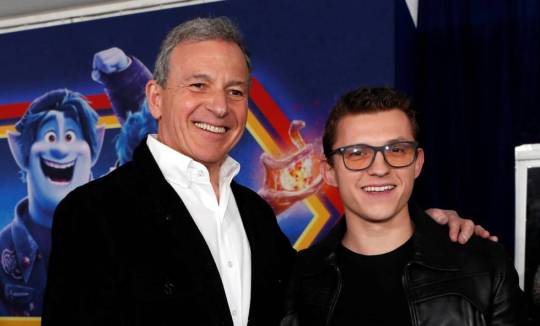
Bob Iger Returns To Chairman And Chief Executive Officer Of The Walt Disney Company Due COVID-19 Crisis At Disney
Bob Iger has taken CEO responsibilities back from Bob Chapek at The Walt Disney Company.
"A crisis of this magnitude and its impact on Disney actively treat and help Bob Chapek. Especially for the company that lasts 15 years."
The former C.E.O. thought he was riding into the sunset. Now he’s reasserting control and reimagining Disney as a company with fewer employees and more thermometers.
The Walt Disney Company turned franchises like Marvel and “Star Wars” into the biggest media business in the world, and last fall it was putting the finishing touches on the image of a storied character: its chief executive, Bob Iger.
In late September, Mr. Iger, 69, published “The Ride of a Lifetime,” an engaging work of self-hagiography. The handsome executive, who seriously considered running for president this year, spent the next month on the kind of media tour that Disney is known for: he reveled in the successful start of a streaming service that immediately rivaled Netflix, was hailed as “businessperson of the year” by Time and described as “Hollywood’s nicest C.E.O.” in an article in the The Times by Maureen Dowd. Even his friends wondered if the soft-focus Instagram ads produced for his MasterClass on leadership were a bit much.
It all went so well that Mr. Iger decided it was time to do something he had postponed four times since 2013: retire as C.E.O.
In early December, Disney executives say, he told his board that he was ready to leave. Around that time, a handful of people in Wuhan, China, began developing mysterious coughs.
At the end of January, a few days after Disney was forced to close its Shanghai theme park as the coronavirus spread, Mr. Iger and the board stuck with their plan, agreeing that he would step back to become executive chairman and that the low-profile head of the parks and cruise business, Bob Chapek, would take over immediately as chief executive. They finalized the arrangement even as the stock market began to shudder. And on Feb. 25, they shocked Hollywood with the news that Mr. Iger’s 15-year run had ended.
The seemingly abrupt announcement prompted intense speculation about the reasons for Mr. Iger’s exit. “Sex or health?” one media executive who knows him texted another that night. Two weeks later, a different question emerged: Had Mr. Iger, with his deep ties to China and legendary timing, seen the coronavirus about to devastate his global realm? Did he get out just in time?
Mr. Iger, who has always carefully managed his image, told me in an email, there was no more than met the eye.
“No surprises … nothing hidden … nothing different or odd to speculate about ….,” he wrote, ellipses and all.
In fact, people close to Mr. Iger and the company said in interviews that the real question wasn’t whether he saw the crisis coming — but whether his focus on burnishing his own legacy and assuring a smooth succession left him distracted as the threats to the business grew. No big media company is more dependent on its customers’ social and physical proximity than Disney, with its theme parks and cruise lines. Few have been hit harder by the pandemic.
And now, Mr. Iger has effectively returned to running the company. After a few weeks of letting Mr. Chapek take charge, Mr. Iger smoothly reasserted control, BlueJeans video call by BlueJeans video call. (Disney does not use Zoom for its meetings for security reasons.)
The new, nominal chief executive is referred to, almost kindergarten style, as “Bob C,” while Mr. Iger is still just “Bob.” And his title is “executive chairman” — emphasis on the first word.
Mr. Iger is now intensely focused on remaking a company that will emerge, he believes, deeply changed by the crisis. The sketch he has drawn for associates offers a glimpse at the post-pandemic future: It’s a Disney with fewer employees, leading the new and uncertain business of how to gather people safely for entertainment.
“It’s a matter of great good fortune that he didn’t just leave,” said Richard Plepler, the former HBO chief. “This is a moment where people first and foremost are looking to an example of leadership that has proved itself over an extended period of time — and Bob personifies that.”
The story of the Walt Disney Company since Mr. Iger’s predecessor, Michael Eisner, took it over in 1984 is one of astonishing growth that has become the model for the modern, global media business. The company turned its tatty icons like Mickey Mouse into cash cows. Mr. Iger has spent more than 40 years working for companies that are now part of Disney, and has earned his reputation through bold acquisitions. He bought Pixar, then Marvel, then Lucasfilm, for single-digit billions, and quickly created many more billions in value with them. Mr. Iger had the greatest job on earth, ruling not just a company but a “nation-state,” as California’s governor, Gavin Newsom, described Disney recently.
But Disney’s much-imitated model was almost perfectly exposed to the pandemic. The shift from on-screen entertainment into in-person experiences helped Disney become the biggest media company in the world. But those businesses have been impossible to protect from the pandemic. The company’s largest division brought in more than $26 billion in the year ending last June by extending its brands to cruise ships and theme parks. Those are all shuttered now. It has three new cruise ships under construction in Germany, their futures unclear. The jewel in its second largest division, television, is ESPN, which in a sports-less world is now broadcasting athletes playing video games. The third group, studio, had expected to bring in most of its revenue from movie openings in theaters, which are now closed.
There has been a glimmer of good news in the introduction of Disney+. The company’s troubled share price jumped about 7 percent in after-hours trading last Wednesday on the news that the streaming service had attracted 50 million subscribers. But the project is still an investment, years away from generating revenue that could replace a big movie opening in theaters. And the service is desperate for new content — at a time when television and film production has ground to a halt.
This all means the company is losing as much as $30 million or more a day, the media industry analyst Hal Vogel estimated in an interview. The company borrowed $6 billion at the end of March, a sign both of its desperate plight and lenders’ confidence that it could rebound.
In an emergency like this, Mr. Iger said, he had no choice but to abandon his plan to pull back.
“A crisis of this magnitude, and its impact on Disney, would necessarily result in my actively helping Bob [Chapek] and the company contend with it, particularly since I ran the company for 15 years!” he said in his email.
That realization appears to have hit just after the company’s March 11 annual shareholder gathering in Raleigh, N.C., which served as Mr. Chapek’s debut and was staged as a carefully scripted handoff.
“I’ve watched Bob [Iger] lead this company to amazing new heights, and I’ve learned an enormous amount from that experience. I feel incredibly fortunate to be able to work closely with him during this transition,” Mr. Chapek said at the meeting. (A Disney spokeswoman declined to make Mr. Chapek available for an interview.)
The men flew from there to Walt Disney World in Orlando, Fla., to meet executives worried about the effect of social distancing on their business; they announced the park’s closing the next day. Then, they flew back to Los Angeles and on the way, said a person familiar with their conversation, they discussed the depth of the crisis. Mr. Iger made clear that he would remain closely involved.
The next day, March 13, was their last in the office. In early April, Mr. Chapek sent a bleak internal email announcing a wave of furloughs. He pushed immediate cuts and freezes on everything from development budgets to contractors’ pay.
The company employed 223,000 as of last summer, and won’t say how many workers are furloughed, but the numbers are huge. It includes more than 30,000 workers in the California resort business alone, according to the president of Workers United Local 50 that represents some of those workers, Chris Duarte. Another 43,000 workers in Florida will be furloughed, the company confirmed on Sunday. All the workers will keep their benefits, but their last paychecks come April 19.
The mood at Disney is “dire,” said a person who has done projects with the company. “They’re covering the mirrors and ripping clothes.”
Mr. Iger, meanwhile, is trying to figure out what the company will look like after the crisis. One central challenge is to establish best practices for the company and the industry on how to bring people back to the parks and rides while avoiding the virus’s spread — using measures like taking visitors’ temperatures.
Mr. Iger also sees this as a moment, he has told associates, to look across the business and permanently change how it operates. He’s told them that he anticipates ending expensive old-school television practices like advertising upfronts and producing pilots for programs that may never air. Disney is also likely to reopen with less office space. He’s also told two people that he anticipated the company having fewer employees. (Mr. Iger said in an email on Sunday evening that he had “no recollection of ever having said” that he expected a smaller work force. “Regardless, any decision about staff reductions will be made by my successor and not me,” he added.)
Mr. Iger’s own narrative had been written to a neat conclusion. Now, his legacy will probably be defined in the unexpected sequel of one of the great American companies fighting for its life.
And Disney’s endlessly troublesome question of succession — which had finally, for a couple of weeks, seemed settled — may be open again. One person close to the company said Mr. Iger assured Mr. Chapek that the extraordinary circumstances would be taken into consideration in the board’s evaluation of Mr. Chapek’s performance. But in reality, two hard, unpredictable years will determine if he can hold the job. Two other executives who were passed over for Mr. Chapek — Kevin Mayer and Peter Rice — remain at the company. Nobody knows when Americans will go to the movies again, much less get on cruise ships.
And nobody knows when — or whether — Mr. Iger will have another moment to leave on top.
#Disney#Walt Disney Animation Studios#Disney Animation Studios#Walt Disney Studios#Disney TVA#Disney Television Animation#Walt Disney Television Animation#Walt Disney Television#The Muppets Studio#The Muppets#Freeform#FX#FX Networks#National Geographic#Disney Parks Experiences and Products#ABC Network#ESPN#Disney+#Disney Plus#Disneyland#Walt Disney World#20th Century Fox#20th Century Studios#Fox Searchlight Pictures#Searchlight Pictures#Blue Sky Studios#Bob Iger#Bob Chapek
21 notes
·
View notes
Link
‘Last Jedi’ Didn’t Undo ‘Force Awakens,’ But ‘Rise Of Skywalker’ Retconned Disney’s ‘Star Wars’ Saga
There is a difference between offering unpopular answers to a previous film’s questions and replacing the answers of a previous installment with your own in the next sequel.
Four months after its domestic theatrical debut (not counting Thursday previews), Star Wars: The Rise of Skywalker ($515 million domestic and $1.174 billion worldwide) will be our last blockbuster movie at least until Tenet in July. I will use this “once a month” Rise of Skywalker post (which will continue until theater re-open or until morale improves) to complain about Force Awakens editors Mary Jo Markey and Maryann Brandon (specifically Markey) arguing in a Mission: Impossible podcast “Light the Fuse,” stating that The Last Jedi (slight paraphrasing) so consciously undid the storytelling of The Force Awakens. We’ve been having this conversation for 2.5 years. It’s one thing when critics, bloggers, pundits, random folks on social media and the like get into this debate. But when the folks actually working on the movies do, failing to understand what a retcon actually is, well...
Star Wars: The Force Awakens used the narrative backbone of the first Star Wars movie to reintroduce the franchise, including a handful of “original trilogy” characters (Han Solo, Leia Organa, Chewbacca, etc.), along with new would-be heroes and villains in a crowdpleasing blockbuster adventure that earned $937 million domestic and $2.068 billion worldwide. I felt the film was too slavishly devoted to the structure and character beats of the original film to its emotional detriment, but my dad (who I was able to fly out for the premiere as a 70th birthday present) loved it, plenty of my fellow critics liked it and the new characters (Rey, Finn, Kylo Ren, etc.) became instant favorites with fans young and old. It also teased character-specific reveals about its new heroine and its new villains while ending on a big cliffhanger.
The Force Awakens ended with Han Solo having been slain by his own son and Finn in a coma with Rey having realized that she had “Force powers” and tracking down a self-exiled Luke Skywalker. We weren’t told if Rey’s lineage or Snoke’s origins had any bearing on the story, we weren’t told if Finn would survive his light saber battle with Kylo (although we all presumed he would) and we certainly didn’t know for sure why Luke, now looking like an elder hermit, had skipped out on the “First Order versus Resistance” battle and hidden away at the first Jedi temple. It is entirely fine that The Force Awakens left these threads dangling in the wind, and that the film (which was absolutely guaranteed to have a sequel) ended with a glorified “To be CONTINUED!”
Yes, I would argue that much of the speculation and debate over Snoke’s origins and Rey’s parentage was not from the movie but from bloggers and writers who spent the next two years offering what at best were educated guesses. With J.J. Abrams not returning to helm The Last Jedi and Colin Treverrow already signed to direct “Star Wars IX,” we really had no idea A) what Abrams’ answers to those questions might be or B) if those threads really mattered at all to the grand story. It was possible that Snoke was just a political operator, and that Rey’s obsession with her parents was purely part of her “the belonging you seek lies not behind you but in front of you” character arc (personified in Finn and Han risking capture and death to rescue Rey from Starkiller base).
Now it is 100% fair to not be happy with how things played out in Rian Johnson’s The Last Jedi. The middle flick in Disney’s Star Wars trilogy revealed that A) Rey’s parents were nobodies who didn’t even love her and B) Snoke was merely a stepping stone to Kylo Ren seizing control of the First Order. Sure, maybe you wanted Rey to be a Skywalker or a Palpatine. Maybe you expected Snoke to have a backstory or a reveal as some long-ago Star Wars character (Mace Windu?) reborn as a genocidal dictator. But there is a big difference between “I didn’t like Last Jedi’s answers to the questions Force Awakens posed” and “Last Jedi knowing rewrote or retconned Force Awakens.” Just because the onscreen events didn’t match your head-cannon doesn’t make them incorrect.
The Force Awakens no more gave us answers to its questions than did Tim Burton’s Planet of the Apes offer an explanation to its infamous “now the apes rule our Earth too” cliffhanger. If you listen to the DVD commentary to that 2001 “re-imagining” (which was still so disliked that it didn’t spawn a sequel despite earning $385 million on a $100 million budget), you’ll hear Burton specifically stating that he intentionally didn’t offer an explanation for why the Abraham Lincoln statue now resembled Tim Roth’s ape baddie specifically so whomever directed the follow-up could offer their own answers. You can debate whether that was the correct choice, but I would argue that Abrams, again this is not a criticism, did the exact same thing in The Force Awakens.
He left Luke on an island, put Finn into a coma, turned Poe from a “dies in the first act” cameo to a major supporting character and said “Okay, it’s your ball now, go play.” In a sense, that was generous of him, since it meant that The Last Jedi had more freedom to use that first film however it chose. The problem is that Treverrow essentially got sacked and Abrams came back to helm the third installment. The result was a retroactive retcon of The Last Jedi’s character beats and plot twists. I don’t think Treverrow’s (alleged) script for Star Wars IX is the best thing in the world, but it was at least a “yes, and...” sequel to The Last Jedi. Rise of Skywalker essentially ignored The Last Jedi, to its character-specific detriment.
Rise of Skywalker opened with Rey again being unsure of her Force abilities and lacking confidence in her own powers, Finn pining over Rey and caring more about her than about the “cause,” and Poe regressing to a conventional hot-shot fly boy sans earned maturity from his failed leadership in Last Jedi. Retroactively making Rey into a Palpatine and Snoke into a “cooked in a bottle” clone while bringing a cloned Palpatine back to life not only negated the storytelling of The Force Awakens and The Last Jedi but (to a lesser extent) the original Star Wars trilogy. Bringing the Emperor back to “life” negated Anakin Skywalker’s final sacrifice in Return of the Jedi, while retroactively making Rey Sheev’s grand kid, which Luke and Lea apparently knew all along, turns their previous interactions into a mess of contradictions.
It matters whether the people working on the movies know that offering unpopular or controversial answers to a previous film’s mysteries is not the same thing as rewriting or negating that prior installment. The Last Jedi was (somewhat) controversial partially because it gave unexpected (unpopular?) answers to questions teased in The Force Awakens. The Rise of Skywalker was (somewhat) controversial partially because it walked back those reveals seemingly to retroactively retain the answers that Abrams had in his head while making Force Awakens, with “new” answers that A) weren’t terribly popular themselves and B) wasted valuable screen-time which could have been spent on a forward-moving sequel to both Force Awakens and Last Jedi. Last Jedi didn’t retcon or undue Force Awakens. But Rises of Skywalker managed to retcon not just its predecessors but the entire Star Wars saga.
2 notes
·
View notes
Text
Panty and Stocking: Series Reflection
If you asked my going into Panty and Stocking whether I expected to like it as much as I ended up liking it, I certainly would have said no. On a surface level, it is about as far outside of my comfort zone as you could possibly get. It’s a hard-edged, hard R, filthy, raunchy, horny comedy with copious swearing, blood and sex. It’s extreme and brazen and loud and occasionally obnoxious. It comes fully formed from the mind of a creator who’s given me oodles of trouble in the past with the way he approaches sex in his work. Everything about this show and the sandbox it was playing in might as well be anti-siren calls warning me to stay the hell away. But there’s a certain truth I’ve come to accept from watching anime as long as I have: there is no such thing as a bad trope, just a bad execution of that trope. There is no archetype or chiche that is truly irredeemable; all it needs is a proper understanding of how it can be used for good. There is no kind of narrative you can never get invested in; with enough intention and focus, you can get invested in anything. Any idea can be worth exploring, any ethos can be worth digging into, any story can be worth telling... all that matters is if it’s told well. And Panty and Stocking proves that fact by being a hard-edged, hard R, filthy, raunchy, horny comedy with copious swearing, blood and sex, extremely brazen and loud, occasionally obnoxious, from the mind of a creator whose work I’ve struggled with before, that I absolutely loved from start to finish, and if anything only grew to love more as it went on.
It’s truly remarkable how effortlessly Panty and Stocking sidesteps so many of the things I hate about this kind of show. The comedy never tips into gross for gross’ sake, always finding an exciting, unique way to interact with vomit and semen. The absurdity of the situation is always grounded in the characters and how they interact with the world. The foul language is elevated by a fantastic dub script and stellar performances that chew their way through each verbal barrage of septic fluid with the unrestrained glee of coked-up anarchists. The cheesecake never drags in unwilling participants, never forcing you to leer at people against their wishes and often mocking the sexiness of the situation itself as the joke instead of playing into the cheap indulgence of it all. Even putting aside the stellar animation and slick American-inspired cartoon aesthetic, this entire production has been carefully constructed to create the most controlled chaos imaginable. Sure, it will freely spin into random references and assorted ridiculous exaggerations just for the hell of it, but on a base, fundamental level, Panty and Stocking works because it refuses to leave anything to chance. It takes the smart choice at every conceivable turn, never steering this cacophanic clown car into a septic tank through negligence, laziness, or ugliness. And in doing so, it embraces an ethos of anarchic freedom that rings more truthfully than anything else Imayishi has ever put out.
Because Panty and Stocking isn’t here to make anyone feel uncomfortable. It doesn’t indulge in the gross, the perverse, and the twisted to act as a gatekeeping asshole towards those it feels are undeserving. All it wants is to have a good time. But moreso than even that, it wants to champion the spirit of what a good time can actually be. And that’s how it manages to be such a remarkable achievement: everything, no matter how seemingly moronic, exists to break through the boundaries of what’s considered acceptable and champion the power of fun itself, no matter how crass or bizarre. The seemingly nonsensical references exist because Imayishi wanted to make those references, so why the hell not make them? The absurd animation makes every single shot pop with electricity and character. The raunchy, foul-mouthed humor serves to let its raunchy, foul-mouthed characters have the chance to be exactly who they want to be, without toning themselves down or compromising for anyone. The anarchy Panty and Stocking triumphs isn’t a cruel, smug anarchy that uses toilet humor and crassness to lord itself over those weaker than it. It’s a truly inclusive anarchy, an anarchy that trumpets the idea that everyone, no matter who they are or where they come from, should have the freedom to be the kind of person they want to be.
And with that driving ethos, it’s able to spiral into a cavalcade of hilarity that constantly keeps its punches focused exactly where they need to be. I cannot begin to describe how deliriously fun this show is on a moment to moment basis, how many utterly iconic lines are already etched into my collection of top-tier quips. It’s a never-ending fever-dream roller coaster ride packed with so much creativity and spunk in every single frame, a whipcrack-smart exercise in utter stupidity that understands why its stupidity is important in the first place. It lets all its characters be as gross and wild and horny as they want to be, because the power of that freedom is what makes them both so entertaining and so important. I laughed at these idiots, I cheered for them, and I was constantly amazed at how deeply the show respected them and their humanity, not in spite of their absurdity, but because of it. It has the courage to let the ridiculous be ridiculous, to let the sincerity be sincere, to never give in to the easy way out and appeal to the lowest common denominator. These characters are exactly who they are, for no one else but themselves, and that crackling confidence comes through in every triumphant flourish of fecal-smeared language that blasts like shotgun pellets between them at regular intervals. I cannot begin to describe how refreshing it is to see a female character get to be sloppy and horny without being degraded for it, who gets to reclaim her sluttiness on her own terms and not for any drooling dudes to gawk over. This is the Hiroyuki Imayishi show that I’ve always wished I could get, and I’m so happy that I finally got it.
Are there flaws? Sure there are. Some of the jokes don’t land, some of the references feel half-baked, and there’s the occasional backslide into uncomfortable territory that thankfully doesn’t last too long. But up against everything that this show represents at its best, those hardly matter. Panty and Stocking is a triumph of trash, a breakneck, fist-pumping cheer for the importance of letting yourself be as sloppy and cringey and weird and honest as you truly are. I love it more and more with every second I spend thinking about it, and I suspect this is going to be the standard upon which I judge all future pretenders to the throne. Thus, I award Panty and Stocking a score of:
8/10
Good lord, that was a blast. Thank you all so much for joining me, and I hope you stick around for the next show on the list:
Yuki Yuna is a Hero
Let the good times continue. See you next time for the start of a new adventure!
#anime#the anime binge-watcher#tabw#panty and stocking#panty & stocking#panty and stocking with garterbelt#panty & stocking with garterbelt
15 notes
·
View notes
Link
Iconic '90s sitcom Friends tried to capture the lives of a group of twenty-somethings in a way that the genre had never done before. While this appealed to new audiences, the edict was clear that their careers shouldn't dominate their lives. Yet, as the show progressed their jobs continued to be an important factor of the narrative.
RELATED: Friends: Ranking The Main Sets/Locations From Least To Most Important
Seemingly not important at first, the workplace decisions of each character would soon impact their relationships with one another and their social standing. Indeed, two of the key romances of the show (Ross/Rachel and Chandler/Monica) had big stories linked to key career choices. Not every workplace decision is a great idea from this group, but that just makes their struggles all the more real and hilarious.
12 Chandler's Worst: Moving To Tulsa
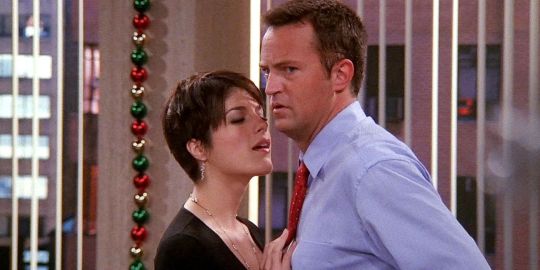
Chandler was extremely unhappy in his career for many years. He thought about making a significant change, although the opportunity and promotion that arose for him weren't exactly what he had in mind.
While he took the chance, there was just one problem: the job was in Tulsa. Chandler would eventually recognize that the opportunity just wasn't right for him, especially since it took such a strain on his relationship with Monica. He really never should have taken it.
11 Chandler's Best: Going Into Advertising

One of Chandler's most compelling story arcs was when he finally took a chance on his talent, quit his job, and looked for the opportunity of a lifetime. He thought advertising could be the best career path for himself and sought a way to make money and be happy.
The internship he started off in certainly seemed demeaning considering the age of the other talent in the same position. His genius writing and hard work paid off, though, as he was awarded an earning role for his efforts.
10 Phoebe's Worst: Selling Out
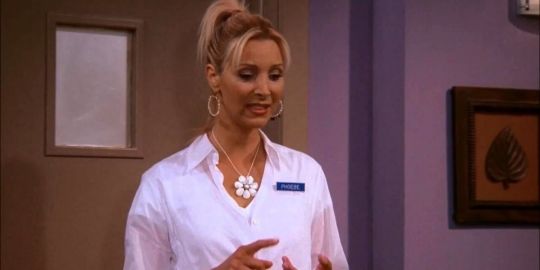
Phoebe has a lot of strong values and principles. She is pretty set in her ways, but that doesn't mean she hasn't been hypocritical now and then. For instance, she absolutely hates the "capitalist" massage chains, preferring her freelance role.
However, she initially sells out, joining one she detests, just for the paycheck. When Rachel tries to snap her out of it and have her stand by her word, Phoebe lies and carries on in the role, continuing to sell out on her values.
9 Phoebe's Best: Not Working In Stocks
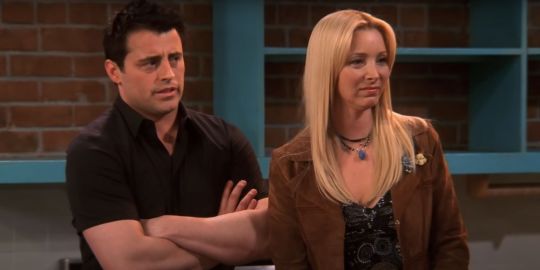
Phoebe revealed that she was once offered a role in the stock market industry, something she turned down at the time. In an alternate future, her fate is shown to the audience, as she struggles to cope with the stress of her job.
RELATED: Friends: 5 Times The Show Was Sex-Positive (& 5 It Wasn't)
It turns out moving away from this potential career path might have just saved her life. Phoebe goes on to lose millions in this alternative version of history and even has a heart attack because of the high pressure.
8 Monica's Worst: The Moondance Diner
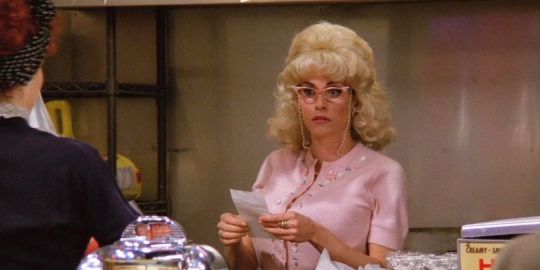
Monica had big ambitions in the culinary world for a lot of her life, but she continued to settle for poor jobs. Sometimes she had to take on certain roles in order to pay the bills, including at The Moondance Diner.
Alas, she made a number of bad choices and didn't stand up for herself quickly enough. Whether it was her romantic entanglements with another waiter, or allowing herself to wear the terrible costumes that were designated; sometimes she needs to take her own advice and look out for herself.
7 Monica's Best: Becoming Head Chef At Allesandro's
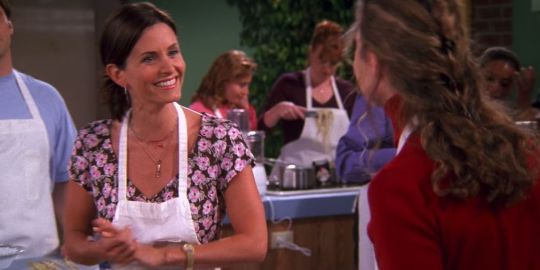
Eventually, Monica's hard work would pay off. She happened to be in the right place at the right time, offering up some food criticism and bringing in fresh ideas that earned her the top spot as head chef of Allesandro's.
It was a dream come true and she would spend the majority of Friends working in the same position. Without taking full advantage of the opportunity she would not have eventually stepped up once again to be head chef at Javu.
6 Joey's Worst: His Soap Opera Digest Interview

Joey doesn't always think before he speaks. This was certainly the case when he had a great chance to be interviewed by Soap Opera Digest. His role on Days of Our Lives was really taking off, but Joey sabotaged his own career.
He made a number of comments about the scripts and making up lines that angered the writers. He was swiftly written out of the show, although in fairness he did eventually find a way back in with the help of a typical soap opera twist.
5 Joey's Best: Hiring Estelle

If Joey from season 1 was to look at the future version of himself, he perhaps would suggest being a bit nicer to Estelle, since she sadly passed away in the final season. Despite supposedly being terrible at her job, she did wonders for Joey's career.
RELATED: 10 Friendship Tips We Learned From Friends
She managed to get him parts in plays, on TV, and even a few movie roles. Sure, some of his parts were a bit rubbish and occasionally it was more Joey who found an opportunity for himself, but hiring Estelle was a great first step on the proverbial ladder.
4 Ross' Worst: The Sandwich Incident
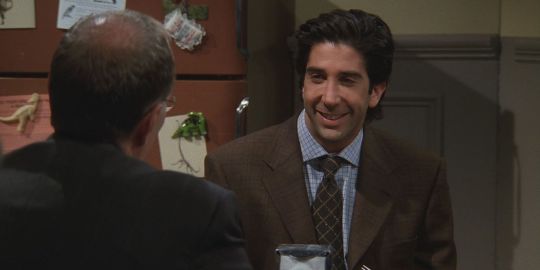
Ross has gone through some pretty sad times. Facing divorce and worried about being alone for most of his life, his anger began to get the better of him. His actions in the workplace were definitely ill-advised, even if it was his famous sandwich.
Ross was suspended after yelling at his boss for eating his turkey sandwich. Even after returning to the museum, though, he was eventually fired as his anger continued to get out of control. He would instead move on to being a university professor.
3 Ross' Best: Getting Tenure
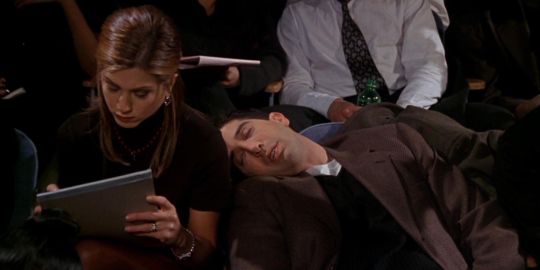
Moving to the university was a good choice for Ross, even if he was a little lazy in his teaching methods. Somehow his performance was enough to get him a bit more job security, and he would spend the rest of the series at the institution.
He got tenure for his work, making the correct decision to take it. He went on a number of research projects, wrote some questionable papers, and continued teaching in this role. Ross did make a number of very strange choices in the job, though, including dating a student.
2 Rachel's Worst: Not Moving To Paris
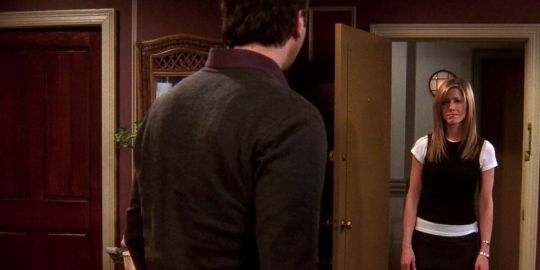
Rachel was given the opportunity of a lifetime with a brand new position in Paris. As the fashion capital of the world, this was really Rachel's dream come true. But the toxic relationship of Ross and Rachel struck again.
Ross always puts himself and his feelings over Rachel's career. While she does ultimately choose to stay, it's really a missed opportunity that could have meant big things for her. Ross seems to take the move in his stride, as if it's what should have happened all along.
1 Rachel's Best: Trying Out Fashion

Rachel took a big risk by cutting herself off from her family fortune. Indeed, no longer receiving daddy's money meant she had to find a job of her own. She began by working basic jobs rather than looking for a specific career path.
Her choice to move into fashion was definitely a smart one. She demonstrated that she had a real eye for the industry and quickly became one of the group's most ambitious members, rapidly rising up through her career.
NEXT: 10 Sitcom Tropes That We're Surprisingly Still Not Sick Of (Yet)
Friends: Each Main Character's Best & Worst Workplace Decisions from https://ift.tt/3daXd2A
0 notes
Text
My Top 25 Games Advent Day 7 - Life Is Strange (#19)
“This shit-pit has taken everyone I’ve ever loved. I’d like to drop a bomb on Arcadia Bay and turn it to fucking glass.”
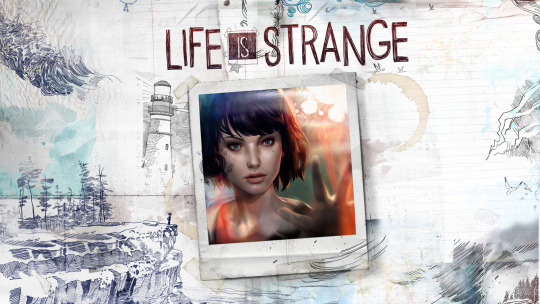
Life is Strange is a bit of a weird one. As yet another episodic adventure game, Life is Strange sees you take control of the hapless, time-bending Max Caulfield, who’s coming home to sleepy Oregon to start her new life in Blackwell Academy, while reuniting with her old friend Chloe. It’s a twisting, turning story filled with unusual characters that drew me in from the very start and didn’t let me go in the long waits between episodes. And on top of that, it has a brilliantly janky, slightly cringey script that could only be written by middle-aged French men.
Life is Strange just has such a unique vibe, blending out-of-touch teen dialogue, overblown sci-fi jargon, slice of life plot elements and more Twin Peaks weirdness than actual Twin Peaks. And somehow, it all just works so well. The story, starting off fairly small, suddenly blows up in scale after the attempted suicide of Kate (which still ows me everytime) and it’s so brilliantly strung together that by the time I reached the end of episode 4, I was foaming at the mouth waiting for the finale. Every character is perfectly developed, showing multiple sides to their personalities until seemingly everyone you come across is a gray area in some way. I absolutely adore how this game showcases its villains motivations and contexts without justifying or forgiving their behaviour. David Madsen, the ex-military step-dad who literaly spies on his family, before absolutely breaking down at the end when he was unable to save her, instead saving Max’s life as penance. Nathan Prescott, the rich bully, whose severe mental health issues made him easy to manipulate by the game’s real villain, fucking Mr. Jefferson. And the fact that he’s the one pulling all the strings is something you will not guess earlier on unless you are paying pinpoint attention to absolutely everything he says throughout the game. The narrative also tackles a whole shit-ton of sensitive issues in a way that doesn’t feel ham-handed or badly executed.
To embellish these amazingly written characters and narrative threads, the setting of Arcadia Bay in Oregon is perfect. The sleeping, rundown town by the beach that seems to be in a constant state of sunset is an amazing setting for the story they’re telling. The game takes on a subtly sort of graphic novel art style, shading in details in the setting in this style and it gives the game its own unique visual flair that I’m really into. The game’s central setpieces; the academy itself, the junkyard, the cafe, they all maintain this distinct style that really makes you feel as if you’ve been whisked away to Oregon’s coast. Alongside this, the soundtrack, both the ambient music and the indie tracks they chose to play during more impactful scenes, is one of the best soundtracks I’ve heard in a game. The edgy music-videoesque endings to each of the starting episodes makes my inner 15 year old very happy, the scene of Chloe finding Rachel’s body has a song that tears me up and, last but not least, Spanish Sahara by Foals during that ending. Ow.
But right, this is a game. It does in fact have gameplay. For the most part, the central mechanic of Life is Strange is Max’s inexplicable ability to suddenly rewind time, which makes for an incredibly unique and interesting approach to decision making in the game. When you make a particularly important choice in the game for example, you are allowed to see the outcome of each of your choices in the immediate future before deciding on one with your power. What this ability doesn’t grant you is looking into the long term, leaving up to you to decide which short term reaction is worth the risk and which is going to provide you with the best outcome in the long run. This is much different to any other decision based game I’ve played and it completely changes the core gameplay, as well as your whole thought process when making these choices, some of which are absolutely devastating. However, this leads into my one and only problem with this game, which really must show how much I love it if it still places here. I’ll be the first to admit that the vast majority of your choices impact the story in either completely inconsequential ways or in no way at all. The potential death of Kate, how you treat certain characters, what Max chooses to do basically renders you entirely powerless to stop anything that happens during the game, especially the ending. No matter what, everything comes down to the same choices, the same deaths and the same ending. So that’s why I say this game works better as a linear story rather than a fully fledged ‘decision based’ experience.
Life is Strange pretty much enveloped my whole life at age 15 and, flaws and all, I still love this game. There was a time when I probably would’ve ended up putting this game at number 1, but I’ve since realised that just isn’t true, so here it sits at 19.
Standout Moment Award: The entire tornado section of the last episode is amazing and so atmospheric as the world around you literally falls apart. Big ol’ powerful stuff my dudes.
Standout Character Award: Nathan Prescott. This game knows how to pull off explaining the motivations of despicable characters without excusing them, and Nathan is the most tragic example of this. From all the shit he went through and all the pain he inflicted on others, Jefferson was there, manipulating him through it all. Realising too late what’s been done to him, Nathan sends a desperate voicemail acknowledging he’s going to die and imploring Max to save herself. Ouch.
Tomorrow: No. 18; Tree enthusiasts band together for general jaunt, chaos ensues.
0 notes
Text
Detroit Become Human review: brilliant and flawed
New Post has been published on https://www.etechwire.com/detroit-become-human-review-brilliant-and-flawed/
Detroit Become Human review: brilliant and flawed
It’s no secret video games have long aspired to emulate the grand drama and theatre of cinema, but few developers have attempted to blur that line with quite as much conviction as Quantic Dream. Led by controversial studio head David Cage – a man who divides players and critics as much as the quality of his games does – its output certainly isn’t afraid to veer more into ‘interactive film’ territory than that of a traditional ‘game’.
That same ethos runs through the heart of its latest PlayStation 4 exclusive, and while it retains many of the issues that have dogged Cage’s titles for almost two decades, Detroit: Become Human is the studio’s most accomplished project to date.
It’s both brilliant and flawed, a technical masterpiece on a near five-year-old console where morality, duty and loyalty are all tested in equal measure. Even running on a vanilla PS4, this is one of the best-looking games on Sony’s hardware we’ve seen thus far.
Set in the titular Motor City in 2038, society has been transformed by the advent of technology. The creation of artificial intelligence capable of passing the Turing Test (whereby a machine is able to exhibit human-like intellect and behaviour) sees androids enter every avenue of life. They care for our children, clean our streets and even travel the stars on our most dangerous space voyages. They’re machines designed to serve civilisation, but it’s a civilisation that’s slowly realising these ‘plastics’ are more efficient than they ever could be.
With the environment now irrevocably damaged by an increasing population with a far longer lifespan, and Russia and America on the brink of conflict over resources in the Arctic, we enter a world seemingly on a tipping point.
As the story begins, you’ll guide the journey of three very different androids – Markus, a carer who is treated less like a slave and more like a person; Kara, a housekeeper re-entering a broken and abusive home; and Connor, an advanced model designed to investigate the rising numbers of androids rejecting their programming in favour of independent ‘deviancy’ – as they each attempt to forge their own destiny.
Disaster in Detroit
If you’ve played the likes of Heavy Rain or Beyond: Two Souls before, you’ll be familiar with the gameplay tenets Quantic Dream has stuck to with Detroit.
There are elements from myriad genres at play here – you’ll investigate crime scenes in search of clues, trade bullets in gunfights and solve environmental puzzles aplenty – and they’re all presented in a manner that’s both limiting and empowering. It’s a game that often forgets it’s a game, for better and for worse.
You’ll move each character on-screen with the left analog stick, much like a traditional third-person adventure, but there’s an almost stifling reliance on QTEs (quick-time events). Everything from clearing away dishes and preparing food, to searching for clues and platforming are all based on using a variety of analog stick movement and button combinations.
After a while, you realise you’re less of a player and more of a director as you guide each character through scenarios with multiple branching paths and divergent storylines.
It’s not necessarily a knock on Detroit – it’s no less of a ‘game’ than the likes of Until Dawn or anything Telltale has produced in recent years. But that tangible reduction in agency smacks of troubled fellow PS4-exclusive The Order: 1886.
However, while Ready at Dawn’s neo-Victorian adventure was ultimately sunk by the linearity of its story, Detroit at least spreads its narrative wings with a plot that evolves and transforms with almost every decision you make.
That also means that the game will move on, even if you make a catastrophic mistake. While many QTEs aren’t timed, there’s plenty that are, and should you run out of time or simply make a poor decision in the heat of the moment, it’s possible to kill off any of the three leads during the course of the story.
For the most part, these deaths are permanent too, with the story simply flowing on regardless. It adds a genuine sense of danger to every scene you enter, with some moments in the game reaching Telltale’s The Walking Dead or Mass Effect 2’s suicide mission levels of stress.
These stress-inducing moments aren’t particularly new to Quantic Dream’s output, but the introduction of replayable checkpoints and a storyline tracking system definitely are. The new Flow Chart might seem like sacrilege to purists, but simply being able to see just how many different paths the story has is mind-blowing in itself.
Decisions you make in one chapter can have huge consequences in the next, or one 10 chapters away, with some branching paths completely greyed off if you make certain choices.
Being able to see how certain paths and entire subplots lost can be lost forever makes for a great reason to replay Detroit multiple times. It’s also the kind of setup that will make this a far more attractive experience to those that may have avoided such games in the past.
More human than human
As you might expect for a game that’s so strongly driven by narrative, Detroit’s story is both its strongest asset and the source of its most consistent problems.
The concept of artificial intelligence gaining sentience and questioning its place in the universe is hardly anything new – in fact, it’s arguably had its best interpretations in the likes of Blade Runner and Westworld – but Quantic Dream manages to bring something relatively fresh to table, mainly due to its unflinching mission to include taboo subjects rarely covered in the medium.
Some are handled better than others, and it’s this inconsistency that makes Detroit such an inconsistent experience. The domestic abuse and drug addiction of Kara’s storyline – a subject that gained it and the studio a fair amount of criticism in the run-up to its release – are handled in a far more nuanced manner than previews may have led you to believe (although its a subject that also passes by too quickly to leave any tangible commentary).
But it’s the handling of the build-up to android revolution too quickly descends into tired cliches and melodrama, robbing it of the dramatic pay off it truly deserves.
The same duality pervades the game’s dialogue. Take the quieter and more mundane moments in the story, for example, because it’s here where Cage’s script and direction really come together.
Helping Kara connect with a detached and terrified young girl never feels forced or hackneyed (although this is also thanks to Valorie Curry’s heartfelt performance), while the interplay between the Data-esque Connor and grizzled cop Hank (portrayed by the wonderfully charming Clancy Brown) makes for the best of the three storylines thanks to their genuine chemistry.
It’s just a shame those nuanced moments are forced to coexist with painfully awkward scenes where the dialogue and character motivations suddenly descend into clunky cliche.
For instance, in one scene you’ll guide Connor as he’s questioning another character in an LA Noire-style interrogation, only for it to devolve into a standoff where a bunch of Detroit cops are suddenly drawing pistols at one another and throwing one-liners around like a straight-to-DVD action flop.
These eye-rolling moments don’t occur as often as they did in Beyond: Two Souls or Heavy Rain, but the fact they’re even present at all shows Cage and the rest of the team still have some way to go before the storytelling feels consistently matured.
Talking of Connor, his sections of the story offer the most ‘game’ for your buck. All three characters can scan their environment at any time to pick out points of interest’, but only Connor can scan objects for clues. Doing so enables him to ‘reconstruct’ specific moments based on key items of evidence, much like in the Batman: Arkham series, with highlighted areas offering further clues along the way. This in combination with those aforementioned LA Noire interrogation scenes mean you’ll often find yourself hoping the story will skip back to Connor whenever it’s with Kara or Markus.
The casting is mostly spot on for Detroit, with the exception of Markus. Considering the core of the story revolves around his decisions and the impact they have on the awakening of androids across the world, he ironically remains the most robotic of the three lead performances. Whether its the fault of the actor himself, the quality of his lines (which are, admittedly, the weakest of the three) or Cage’s direction, none of his divergent paths reveal anything other than an unremarkable character leading a worldwide revolution.
Verdict: play it
While it carries many many of the traits of that make a Quantic Dream game so different from the rest of Sony’s first-party exclusives, Detroit: Become Human is still a bold and accomplished experience that’s leaps and bounds away from its previous efforts.
At times it’s often more of a big budget visual novel than a full-on ‘game’, but, nevertheless, its themes, twists and ever-evolving character arcs will likely stay with you long after you put your DualShock 4 controller down.
0 notes
Text
CHS - Essay
Select one or two examples of narrative artwork that include elements of interactivity. Which of Marie Laure Ryan’s types of narrative immersion do these narratives aim to create and how do their interactive elements contribute to or work against immersion?
Both ‘The Stanley Parable’ and ‘The Sims 4’ are vastly popular games in their own right; which thousands of players have partaken in due to their potential for both narrative and play. Whilst ‘The Sims’ is an open, more traditionally sandbox or ‘ludic’ game in which the player can build and control the lives of their sims; creating their own narrative as they go, ‘The Stanley Parable’ is a seemingly more closed, ‘narrative’ game, which would traditionally follow a more linear structure; yet in many ways may be an exception to this format and ‘attempts to find a new form of storytelling’ (MacDonald, 2013) as the creators challenge our preconceptions of what a linear videogame should be. Through the different ways in which these games allow the player to interact and influence the narrative, they aim to create (to varying degrees) immersion, which we will identify via Marie-Laure Ryan’s four types outlined in ‘A Journal of Narrative Studies’ (2009), and then assess how effectively they are produced.
Spatial immersion, Ryan states, ‘Is the easiest to achieve’ (p.54, 2009), as almost all modern videogames, even those with more basic setups and cheaper production, can produce a believable, immersive world in which the player can move around if they can ‘convince… [them] that the space is authentic.’ (Stuart, 2010). In ‘The Sims’ this is achieved through the vast scope of the world and its content. A player can spend hours designing the home of their sims down to the smallest, most insignificant detail of a toilet roll holder, or the colour of the flowers in their window box. The interactivity of this worldbuilding further immerses the player with a ‘sense of being able to make meaningful actions’ (Mateas, Stern, p.29, 2006) allowing the player to tailor the world to suite them and thus making them want to invest time in this creative process; creating ludic immersion, through ‘deep absorption in the performance of a task’ (Ryan, p.54, 2009). In ‘The Stanley Parable’, the detail of the world is to a believable standard and ‘dealing in a familiar environment also allows players to comfortably make assumptions about… blank spaces without being pulled out of the world’ (Madigan, 2012.), the detail in world is less needed because there is so much less avatar interaction with it and it’s objects themselves compared to the Sims. Instead the world in ‘The Stanley Parable’ is more of a support to the narrative; creating further intrigue with a seemingly mundane office environment that contrasts to the increasing sense of unease driven by the game’s narration. Yet this environment still integral to the story, as it’s slow evolution into twisted versions of itself or the way in which it opens up into a different place entirely within this seemingly banal space echoes the sharp twists and turns of the narrative and gives depth to the game’s atmosphere which immerses the player into this strange, unpredictable world. It seems explorable and open at first glance, yet as you progress with the story you learn that it is merely a vehicle through which you may wile away your time, believing you, the player, are in charge, until eventually you discover yourself trapped in one of many narrative arcs, as the game ‘mocks the illusion of choice’ (MacDonald, 2013) that it initially provides you with. In fact, one of the many endings takes this one steps further, dropping you into an environment identical to ‘Minecraft’ a vastly popular exploratory sandbox game; in which virtually all of the immersion is spatial, before the narrator announces, ‘Oh no, no, no, this is far more open ended than I had in mind, I’m looking for something more narrow, something that makes you feel utterly irrelevant.’ (Wreden, 2013) and subsequently dropping you into portal, a popular linear structured game where the aim is to eventually escape the seemingly omniscient voice which narrates your journey and is keeping you trapped in the facility where the game takes place. ‘The Stanley Parable’ shows itself to be extremely self-aware utilising it’s more limited spatial immersion to further it’s narrative; making ‘a joke at the players expense, a commentary on choice and consequence’ (MacDonald, 2013) but only spatially immersive up to a certain point. The Sims on the other hand, with it’s vast interactivity with it’s world, relies much more on spatial immersion to engage the player, ‘it’s open, “sandbox” structure’ supports ‘a much wider range of make-believe’ (Murrey, 117, 1997), and immerses through play.
Epistemic immersion is far less prominent in ‘The Sims’ as it’s gameplay is much less reliant on narrative and thus the need for the effect of any past to create narrative is minimal. Its structure is based on how the ‘story emerges through gameplay’ (Games as Literature, 2015), the players actions and choices are what shape any potential stories, not pre-existing, embedded narrative; and ‘as the world passes from one state to another, a story is created’ (Ryan, p.52, 2009). The Stanley Parable however begins with the simple premise of Stanley’s co-workers all disappearing, and the very way in which gameplay is initiated is through the of this phenomenon; as Ryan describes ‘embedded in an interactive game world, in which the player enacts the narrative of investigator.’ (p.55, 2009). The use of this creates epistemic immersion as the player’s curiosity is piqued and we are driven to discover what caused this world state; giving a ‘feeling of being taken up into the narrative world’ (Matea, Stern, p.29, 2006). This combined with the visual of the environment we are given to explore spatially is what gives ‘The Stanley Parable’ that initial sense of freedom which mimics more open-world games, and at the same time melds with the game’s less immediately obvious narrative focus to give a sense of intrigue that immerses us further. ‘Not knowing what you’re supposed to be doing is the default state’ (Scharr, 2013), but this alone would not be able to hold the player’s interest indefinitely and so is perhaps not the key form of immersion which the designers were aiming to create with ‘The Stanley Parable’, and not at all with the much more present-focused ‘The Sims’.
Temporal immersion is much more significant to ‘The Stanley parable, but maybe less so to ‘The Sims’. As well as spatial immersion through exploring and interacting with the large, constructed world within ‘The Sims’, the nature of the game’s interactivity as much more play-based may lean slightly towards temporal immersion. The structure of the game itself encourages building and furtherment of the story through interaction, and part of the thrill is watching the relationships and lives of your sims develop. But this is still limited, as although there are a large array of interactions and combinations of choices that can lead to different life states for your sims, it is ‘the player that can determine their path through their choice of action’ but because of this structure, ‘the uncertainly is lost’ (Ryan, p.55, 2009) and thus, not very surprising or suspenseful. The game ‘sparks interest by occasionally taking control away from the player in order to stage pre-scripted scenarios that create unexpected turns of events’ (Ryan, p.53, 2009); for example,
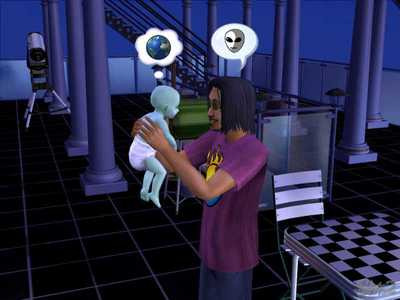
[Fig 1, Sims alien baby(2012)]
a male sim being abducts by aliens and returning pregnant, or even something as simple as a house fire spontaneously starting; with the potential to destroy everything that has been so lovingly created by the player. These pre-scripted events do create suspense then and so some limited temporal immersion in the game, and in a way very similar to how ‘The Stanley Parable’ is structured. However, in general the course of events in ‘The Sims’ is determined by the player rather than by divine intervention. Conversely, in ‘The Stanley Parable’ the player’s experience and likely investment in playing the game is largely driven by temporal immersion, as ‘curiosity, surprise and suspense’ (Ryan, p.55, 2009) are rife within the game’s elusive narrative. This is partially due to the fact that although the game technically falls under a more ‘linear’ structure, it is very unlike many of it’s peers. It is ‘told not through one linear story, but through many instead. Branching paths that twists the illusion of control the game tries so hard to give us’ (MacDonald, 2013) it disobeys the structure of Klopp’s quest/story framework, as although the initial ‘heroic’ questline is there within the game if you follow the narrators instructions, you are also at perfect liberty not to: ‘whether or not you obey the narrator is entirely within the players control’ (Scharr, 2013) and every decision you make unveils yet more surprises. The game keeps the player within it’s grip because you cannot determine what is going to happen next. ‘Everything is a set path’ (MacDonald, 2013) and yet despite this seemingly linear structure, which Ryan would argue is for ‘single traversal, since the story does not renew itself’ (p.51, 2009) there is far more suspense and surprise than the seemingly endless, yet quickly repetitive actions and foreseeable consequences seen within ‘The Sims’. ‘The Stanley Parable’ takes a game format that could be criticised for being narrow and unimaginative and instead seems to evolve and change as you progress through the story; unlike what Ryan argues, no playthrough is the same. The game immerses ludically in how it provides ‘deep absorption’ in the task of navigating the world to reveal more story which brings ‘narrative immersion’ via ‘an engagement of the imagination in the construction and contemplation of a story world.’ (Ryan, p.54, 2009). However, this is still limited in that there are a finite number of scripted actions and endings, once they have all been discovered there is no more surprise or suspense held over the player and thus no temporal immersion. Once this state has been reached then the game becomes less replayable; whereas ‘The Sims’, although perhaps for the most part lacking in temporal immersion due to the nature of it’s interactivity, is immersive for longer due to it’s replayability with a none-linear, mostly spatial immersion.
The final type of immersion, emotional, is demonstrated by both games to a degree. Ryan states that ‘it is by mentally simulating the situation of others… that we feel joy, pity or sadness for them’ (p.56, 2009), and in ‘The Sims’ and ‘The Stanley Parable’ the way in which we interact with the games both narratively and through gameplay can give us some relatability to the characters that we are controlling or playing as. ‘The Sims’ could be seen to be aiming to create emotional immersion by appealing with a ‘narrative of a standard borgeouise bildungsroman… in which material success and a happy family life are the reward for reliability’ (Murrey, 117, 1997) i.e: appealing to what many people strive for, stability, success and family; it could be argued that the immersion that ‘The Sims’ is trying to achieve is via the player living vicariously of sorts, through their sims – living out their dream life. However, this may not equate to the players relation to their character and rather, reflect the emotions more commonly seen felt when playing games; which ‘are overwhelmingly self-directed ones’ (Ryan, p.56. 2009). These are feelings of achievement of accomplishing something through the game, rather than empathising with a character. Similarly, ‘The Stanley Parable’ could be argued to invoke emotional immersion: through witnessing Stanley’s various unfortunate fates, the player could feel pity, yet many would still pursue a course of action that would mean a grisly or hopeless end for Stanley,
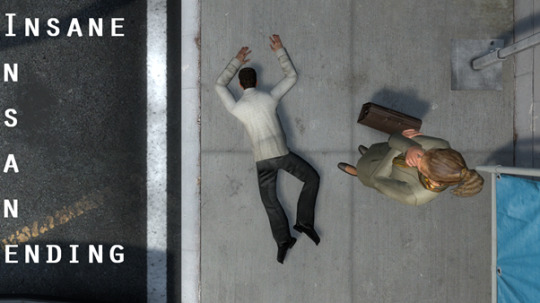
[Fig 2, Stanley Parable insanity ending(2013)]
if it meant potentially furthering their progress or gaining achievement within the game. This showcases emotional involvement through ‘ludic interest’ which ‘regards [the character] as a means to an end’ rather than ’narrative interest’, which ‘regards characters as persons’ (Ryan, p.56, 2009). This is mirrored in how many players of the Sims would deliberately drown their sims in the pool, for entertainment: here arguably, there can be no emotional attachment to characters in either game. But on the other hand, as ‘The Stanley Parable’ progresses, and the game ventures into more philosophical topics via the monologue of the ever-present narrator, an emotional response is often felt to topics raised. In the confusion ending,
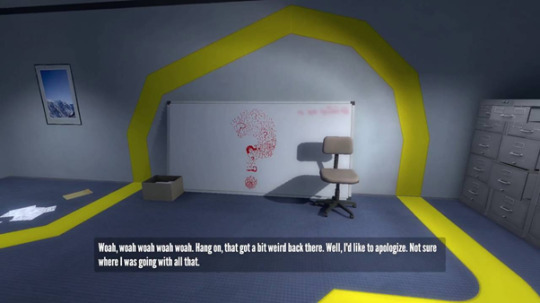
[Fig 3, Stanley Parable – Confusion Ending(2013)]
where rounds of future playthrough and events are written on the wall of the room you are trapped in, your narrator queries disbelievingly ‘Is this how it really goes? It’s all determined?’ (Wenden, 2013) we feel pity for both the narrator and Stanley being stuck in this cycle, and are simultaneously left to question the ideas the narrator raises in a far greater, philosophical sense. This can definitely produce varied emotions for the player, but which are debatable as to whether they are immersive or not as arguably this thought-provoking nature of the content may pull a player out of the game story itself. ‘The Stanley Parable’ is an interesting mix of ludic and narrative elements that sometimes do and sometimes don’t evoke emotional immersion, depending on the situation. Likewise, in the Sims, one playthrough you may spend time and effort on the characters and the world they inhabit, and form an emotional attachment and another you may murder them by some nefarious means
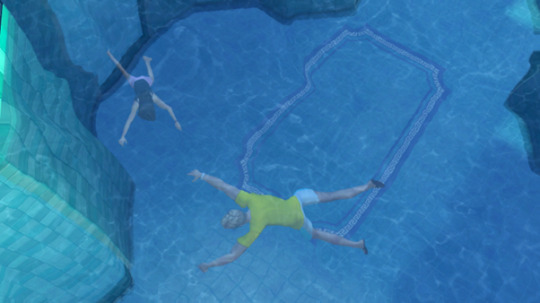
[Fig 4, Sims - drowned in pool(2012)]
just because you can; emotional attachment is down to the player themselves as well as the emotional immersion the game may attempt to draw them in with. Both Games are successful at creating emotional immersion to a degree, it just isn’t the main focal point for immersion in ‘The Stanley Parable’ and ‘The Sims’.
Both ‘The Sims’ and ‘The Stanley Parable’ display all of the four types of immersion to some degree, but each has one or two that have much more emphasis than the others as this would have been the type of immersion the game was specifically designed to create, or rather, was the type of immersion that fit best to that specific mode of gameplay. The Sims relies heavily on spatial immersion to draw in the player, utilising the breadth and depth of it’s world building to create a landscape that the player wants to explore and interact with, as ‘games that seek to deliver emergent experience allow us to make our own story from our own ideas and actions within this arena that the game’s creator has provided us’. In contrast ‘The Stanley Parable doesn’t us spatial as much as its primary source of immersion as it has more of a seemingly free yet in fact limiting world in which it exists, that pushes and pulls you towards different storylines by opening and closing different areas of the map seemingly on a whim. It could be argued ‘the focus on narrativity tends to minimise the role of gameplay’ (Bjork, Holpainen, p.422, 2006) and this is true to an extent with the Stanley Parable’ but spatial immersion still plays a role in advancing the gameplay through narrative via exploration, and thus still plays a fairly significant and effective role in this game. Epistemic immersion is not conducive to the format of the Sims as a game, and so is not really present, on the other hand in the ‘Stanley Parable’ epistemic immersion plays a large role in prompting the player into an investigation, alongside temporal immersion: the type which is most emphasised by the ‘Stanley Parable’s’ more narrative style as it successfully builds suspense with its unpredictable narrative which refuses to follow a linear structure. In the Sims temporal immersion is only there to a slight degree, as there is much less potential for surprise and suspense in ludic gameplay than there is in the more narratively driven ‘Stanley Parable’; in fact the only times in which ‘The Sims’s temporal immersion is effective is within it's rare, pre-scripted events that mirror the more narrative style of game. As for emotional immersion, both games undoubtedly have moments which could be seen as emotional, but whether they successfully engage the player is less certain as both these games don’t quite have the linear character-driven style in which this sort of immersion is most effective.
‘The Sims’ sole focus on mainly spatial immersion could be seen as negative and the absence of narrative giving the player a feeling of ‘lack of closure to their output’ (Ryan, p.52, 2009), but it works well with the game’s sandbox format; allowing the player to either have continuous, personally crafted narratives, or to simply play, as why should ‘they start from the assumption that play must serve something which is not play’ (Huizinga, p.2, 1949). ‘The Stanley Parable’s melding of all four forms of immersion; with particular focus on epistemic and temporal leans away from the emotionally driven systems of it’s peer “linear” games, who’s dialogue, Ryan describes as ‘selecting an item from a list of utterances’ (p.49, 2009). Instead it’s almost sandbox-like illusion gives a sense of exploration to the player, that accompanies the suspense driven narrative into a truly thrilling unpredictable compilation of events which fully immerses the player; even if it does leave us ‘questioning what the point of choice is at all in a system where every premutation is laid out for you’ (MacDonald, 2013).
Bibliography
Bjork, S., Holopainen, J. (2006) ‘Game and Design Patterns’, in Salen,K., Zimmerman,E. The Game Design Reader: A Rules of Play Anthology. Cambridge, Massachusetts: The MIT Press, pp.422.
Fig 1: Unknown, Sims – alien baby,(2012) [online] available at http://www.fanpop.com/clubs/the-sims-2/answers/show/279396/what-happens-u-abducted-aliens-ur-sims-ever-come-back-how-can-u-abducted-aliens , Accessed 15/1/18
Fig 2: Unknown, Stanley Parable- insane ending,(2013) [online] available at: https://steamuserimages-a.akamaihd.net/ugc/884127381004717892/AE322788BD0AC351A0EA822942A1578FBF8D418B/ Accessed 15/1/18
Fig 3: Unknown, Stanley Parable – confusion ending,(2013) [online] available at: https://i.ytimg.com/vi/5W5WkQXENyQ/maxresdefault.jpg Accessed 15/1/18
Fig 4: LeJaque. Y, Sims – drowning,(2012) [online] available at: https://kotaku.com/it-only-took-me-an-hour-to-drown-my-sims-in-their-new-p-1654618761 Accessed: 15/1/18
Galactic Café., Wreden, D. (2013) The Stanley Parable. [Videogame]. Galactic Café.
Games as Literature. (2015) Games as Lit. 101 – Emergent Narrative. [Online] Available at: https://www.youtube.com/watch?v=_tvvgRvxbWI&feature=youtu.be Accessed: 13/1/18
Huizinga, J. (1949) Homo Ludens. London: Routledge
MacDonald, K. (2013) IGN- The Stanley Parable Review. [Online] Available at: http://uk.ign.com/articles/2013/10/18/the-stanley-parable-review Accessed: 13/1/18
Madigan, J. (2012) Psychology Today – The Psychology of Videogame Immersion. [Online] Available at: https://www.psychologytoday.com/blog/mind-games/201207/the-psychology-video-game-immersion Accessed: 14/1/18
Mateas, M., Stern, A. (2006) ‘Interaction and Narrative’, in Salen,K., Zimmerman,E. The Game Design Reader: A Rules of Play Anthology. Cambridge, Massachusetts: The MIT Press, pp.648.
Maxis., The Sims Studio. (2014) The Sims 4. [Videogame]. Electronic Arts.
Murrey, J. (1997) Hamlet on the Holodeck. Cambridge, Massachusetts: The MIT Press
Ryan, M-L. (2009) ‘From Narrative Games to Playable Stories: Towards a poetics of Interactive Narrative, In ( Herman, D.) Storyworlds: A Journal of Narrative Studies, 1, pp.43-59. [Online] Available at: https://app.box.com/s/redplmsxphd3ekr56jrtlb1zx2ywv84k. Accessed: 13/1/18
Salen, K., Zimmerman, E. (2006) The Game Design Reader: A Rules of Play Anthology. Cambridge, Massachusetts: The MIT Press, pp.29.
Scharr, J. (2013) Tom’s Guide-Review ‘The Stanley Parable’-You Think You’re in Control? [Online] Available at: https://www.tomsguide.com/us/the-stanley-parable-review,review-1933.html Accessed: 13/1/18
Stuart, K. (2010) The Guardian – What do we Mean When we Call a Game Immersive? [Online] Available at: https://www.theguardian.com/technology/gamesblog/2010/aug/10/games-science-of-immersion Accessed: 14/1/18
Weibel, D., Wissmath, B. (2011) ‘Immersion in Computer Games: The Role of Spatial Presence and Flow’, in Thalmann, D. International Journal of Computer Games Technology. vol, 2011. Pp.1-14. Hindawi [Online] Available at: https://www.hindawi.com/journals/ijcgt/2011/282345/ Accessed: 13/1/18
0 notes